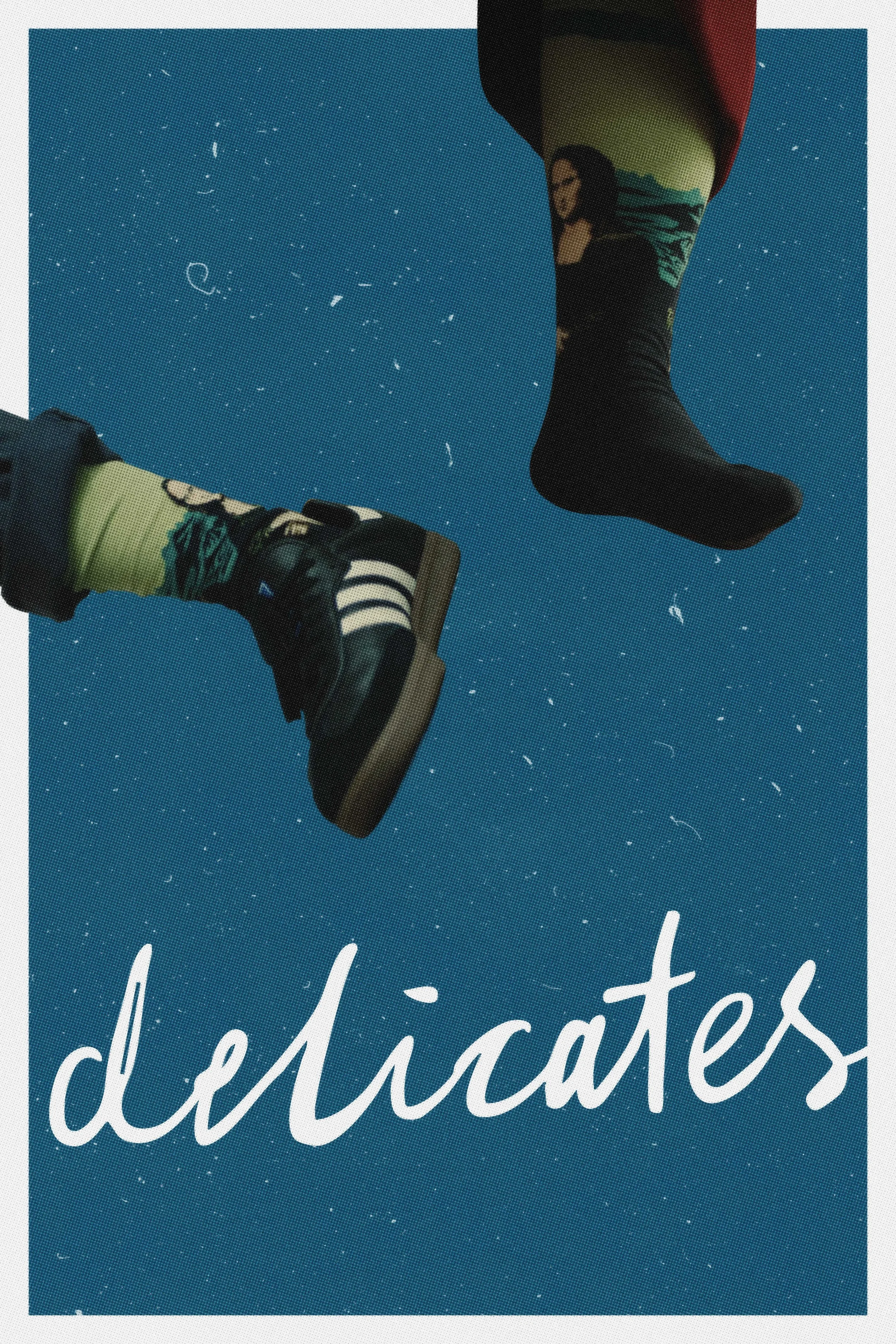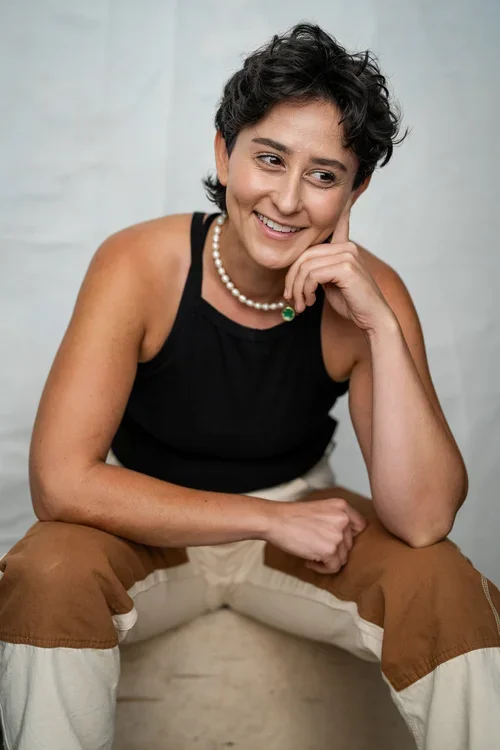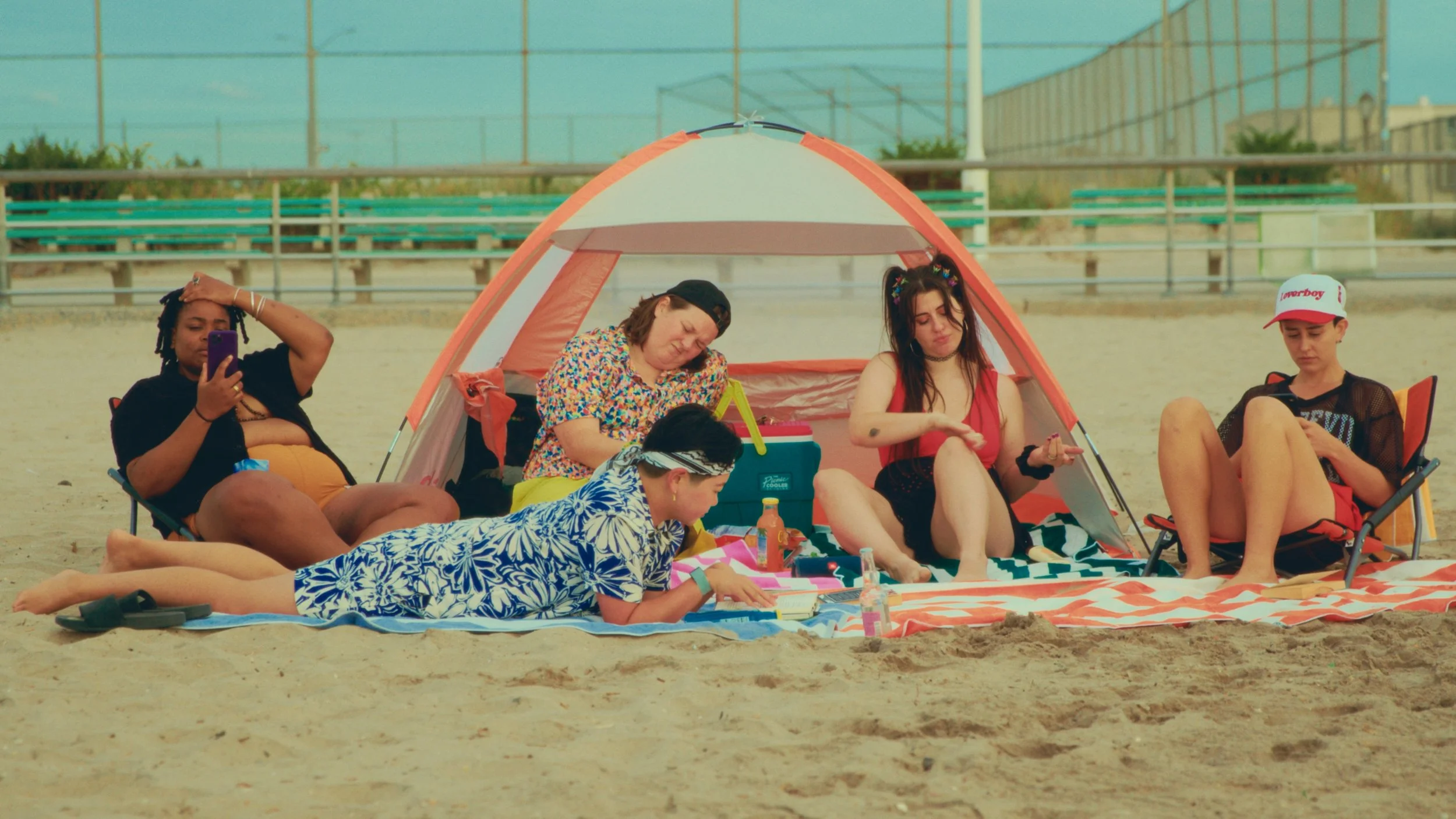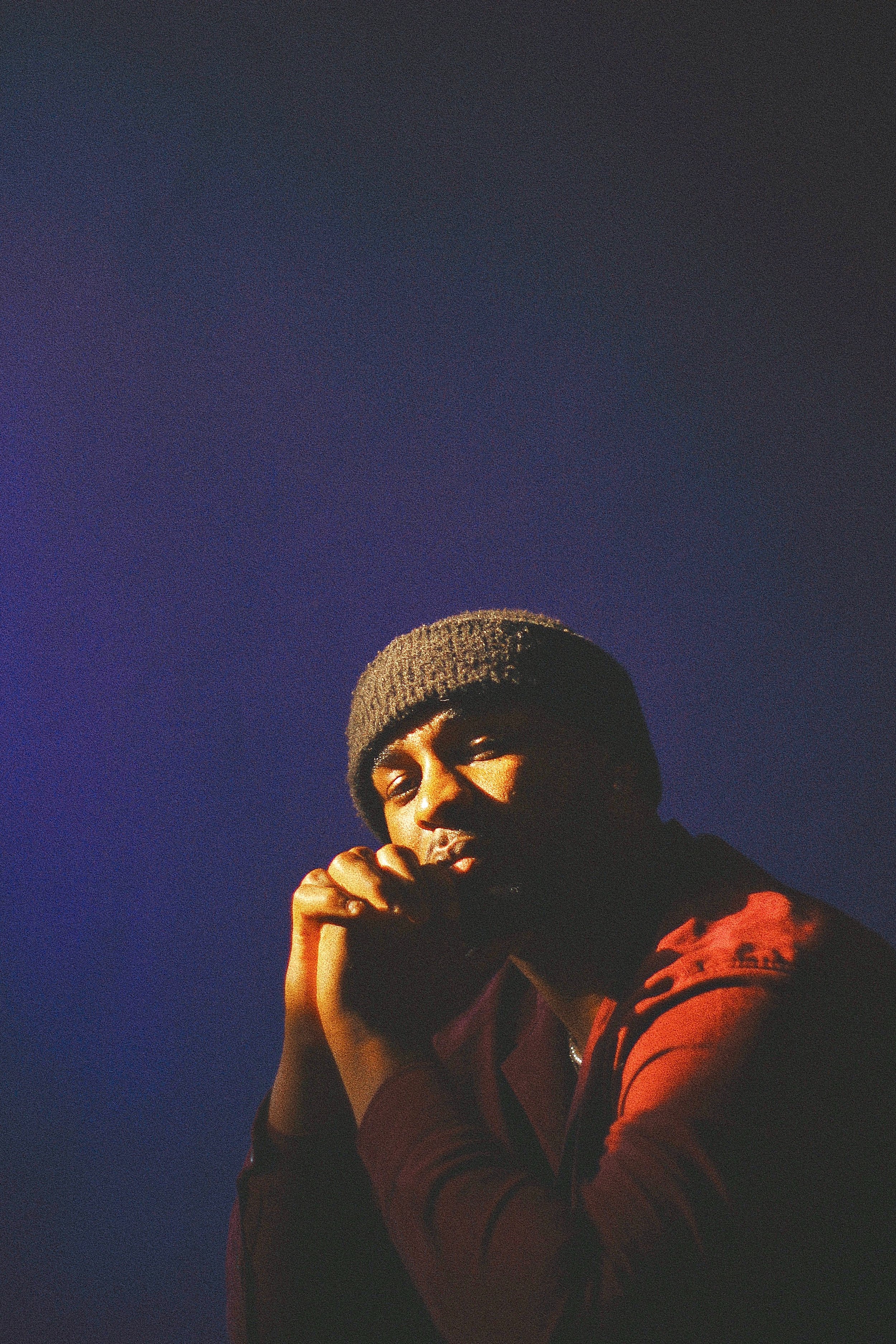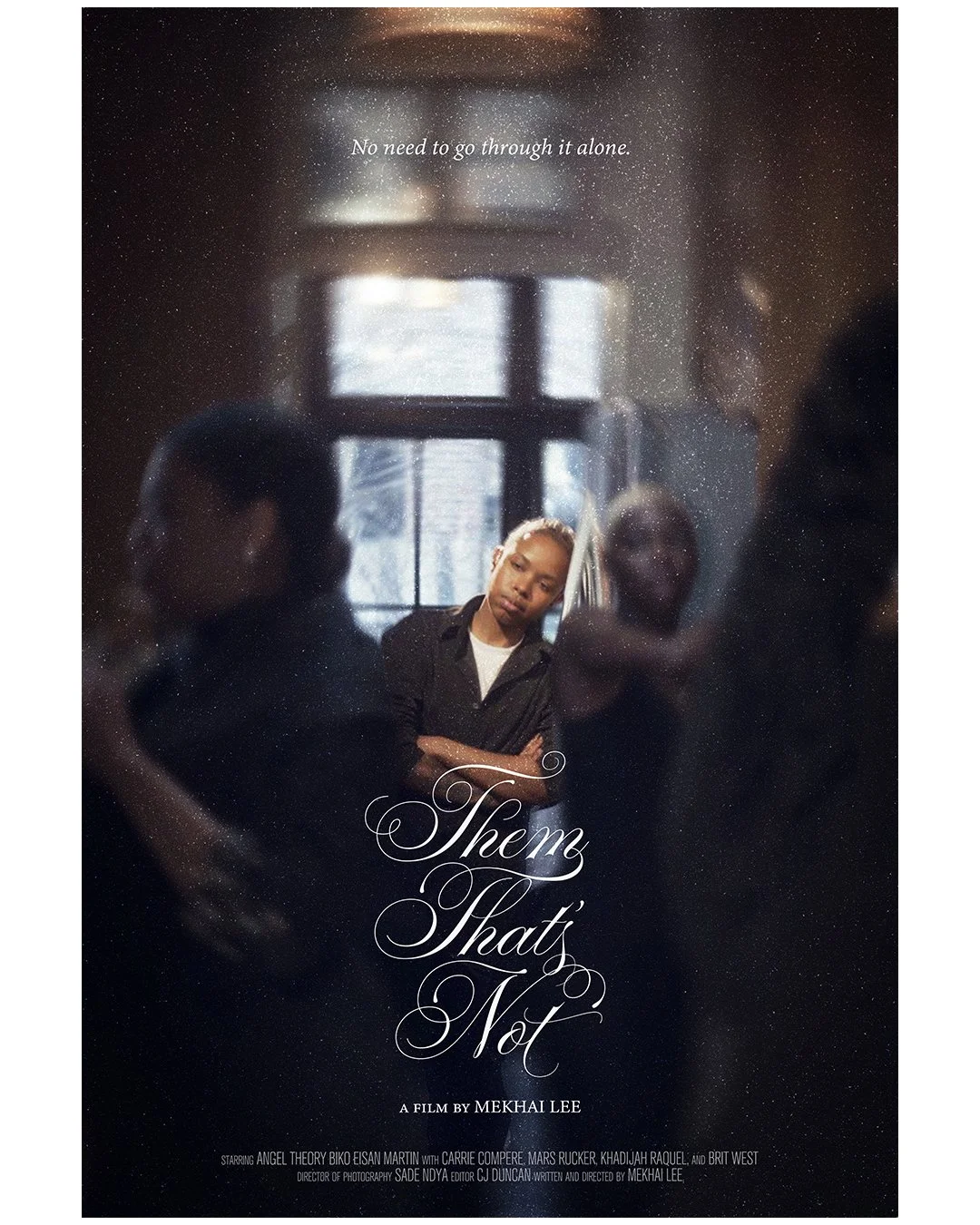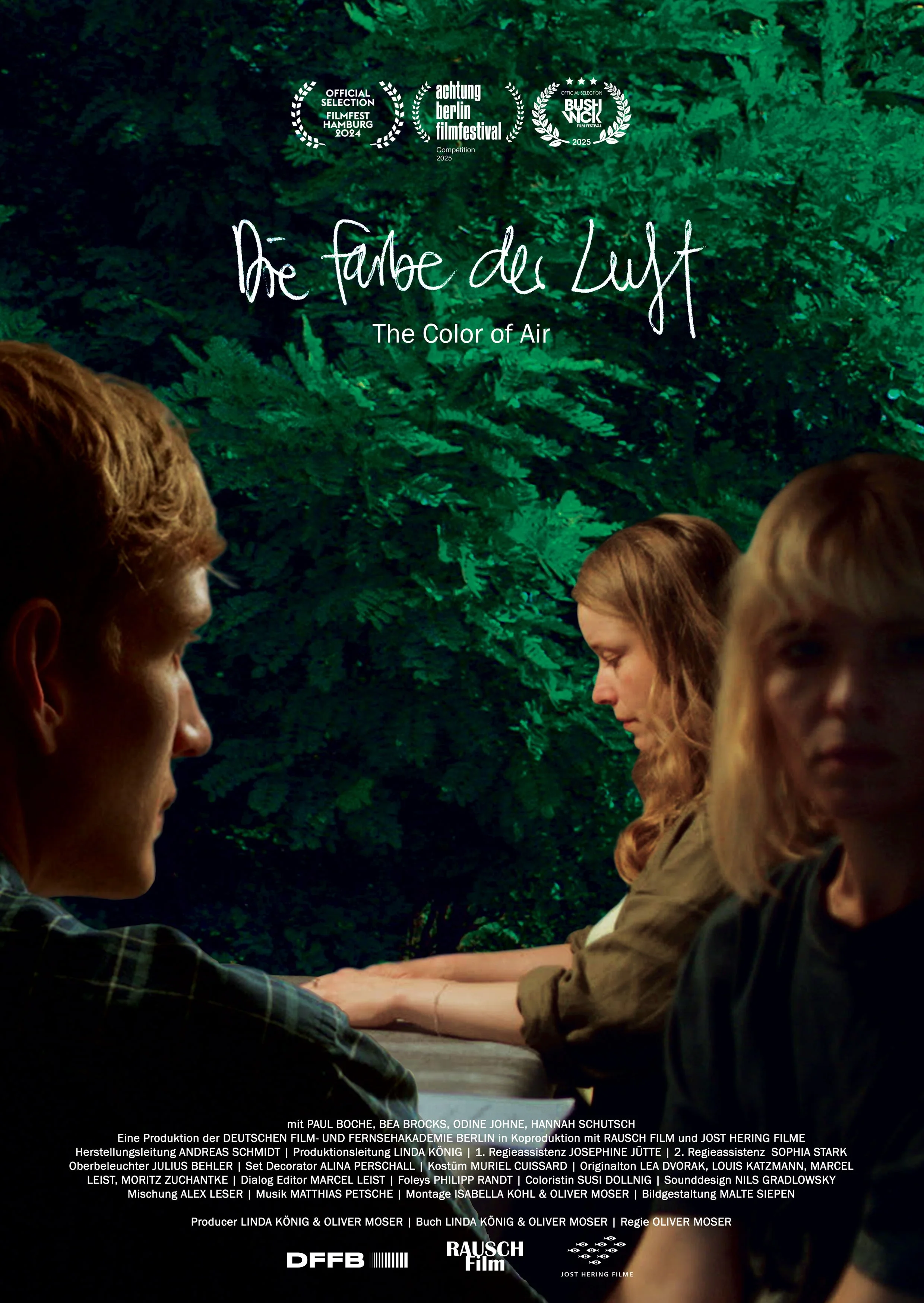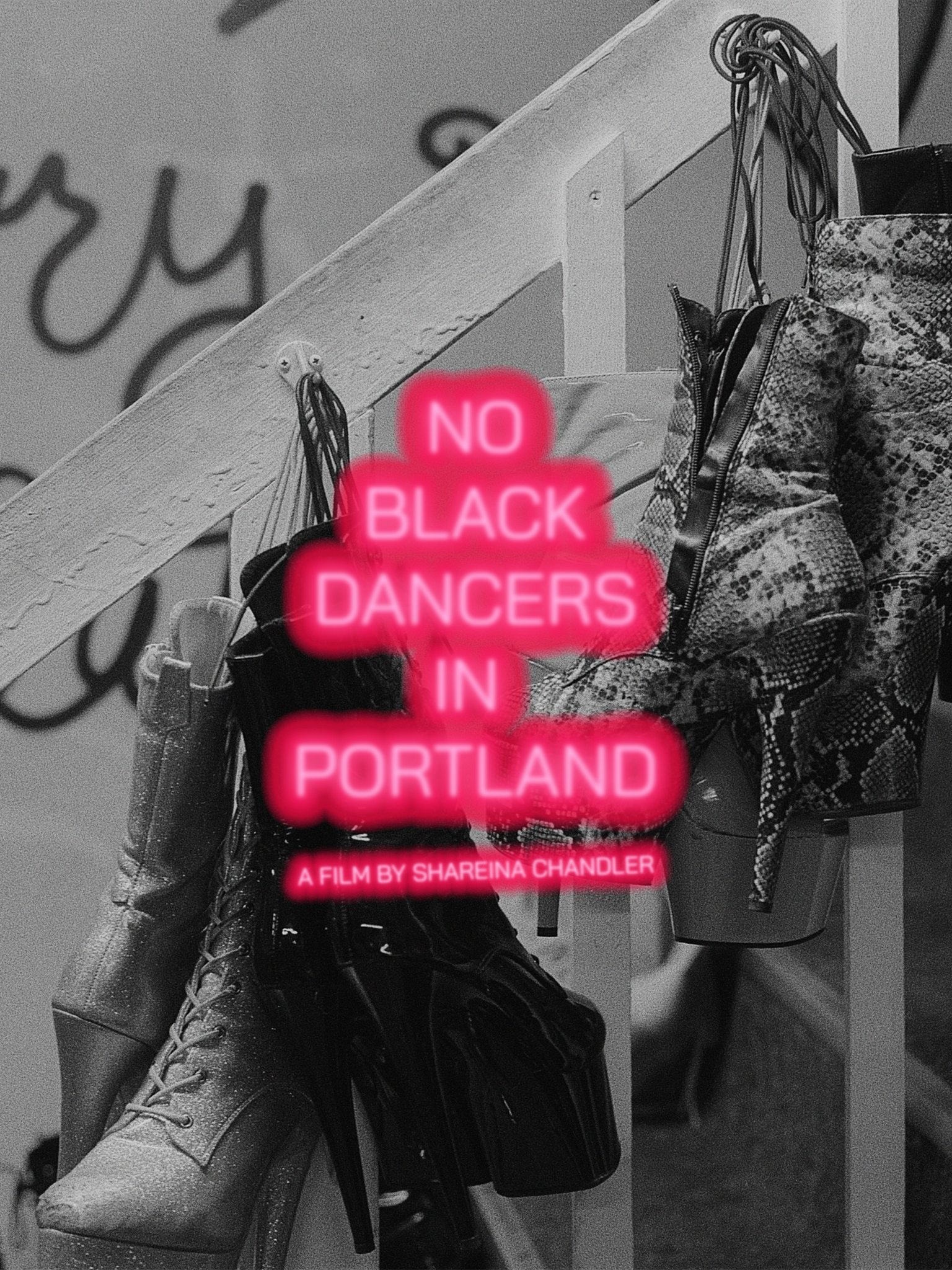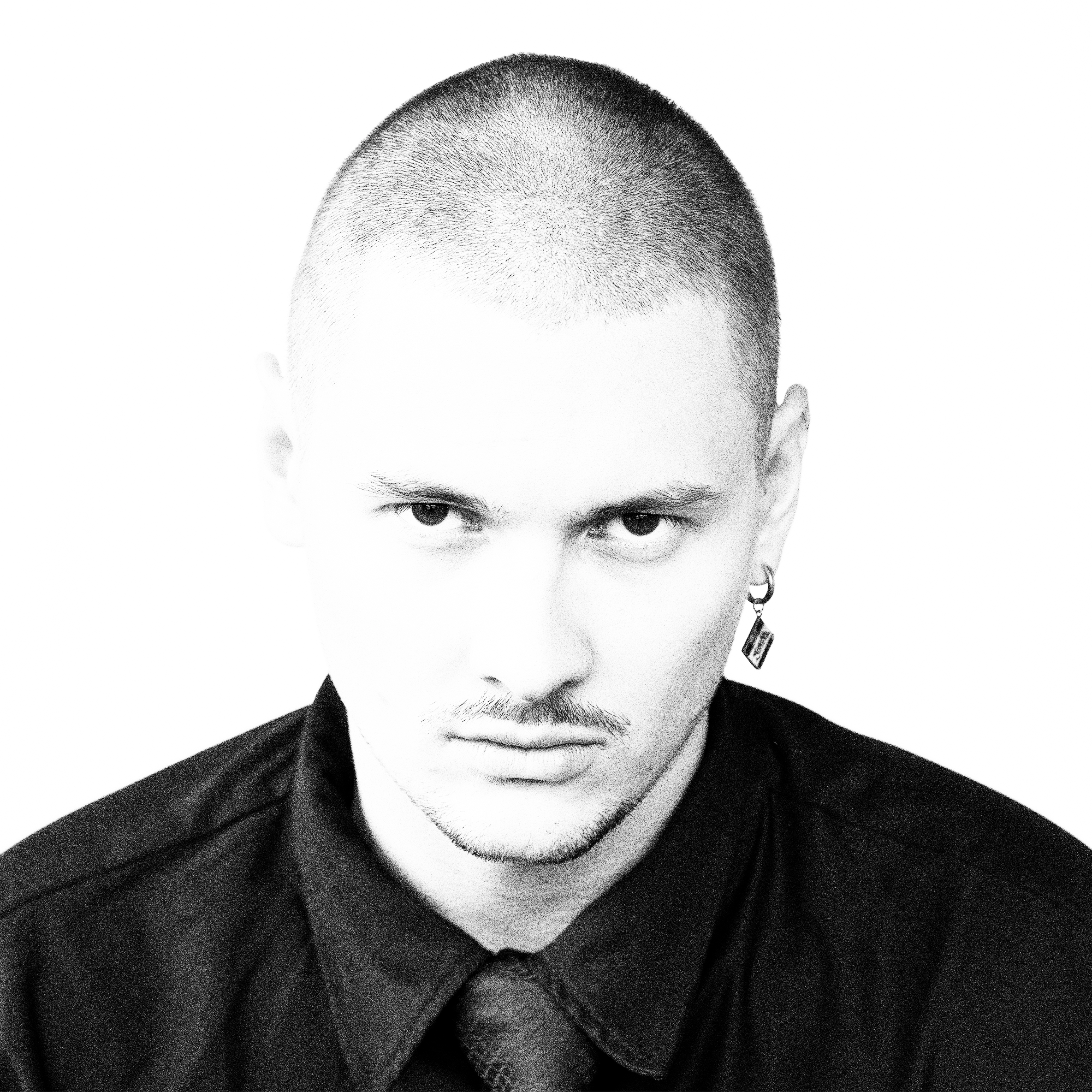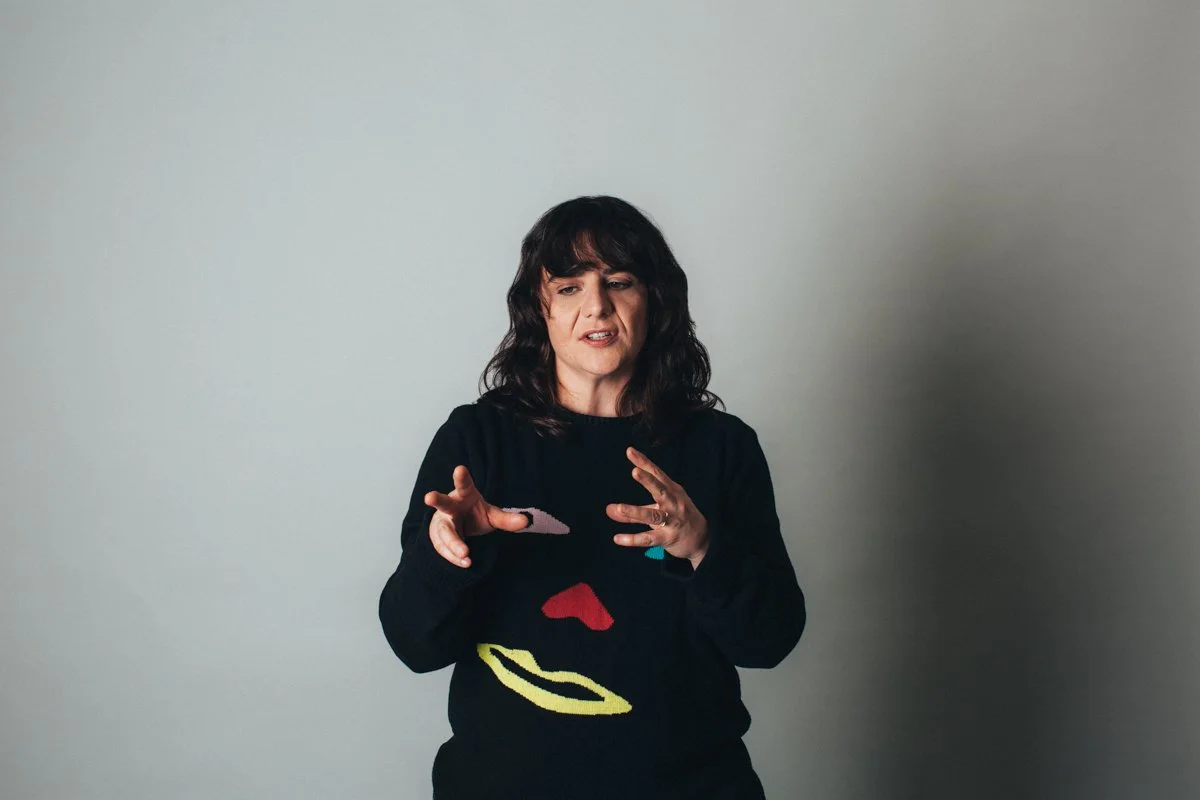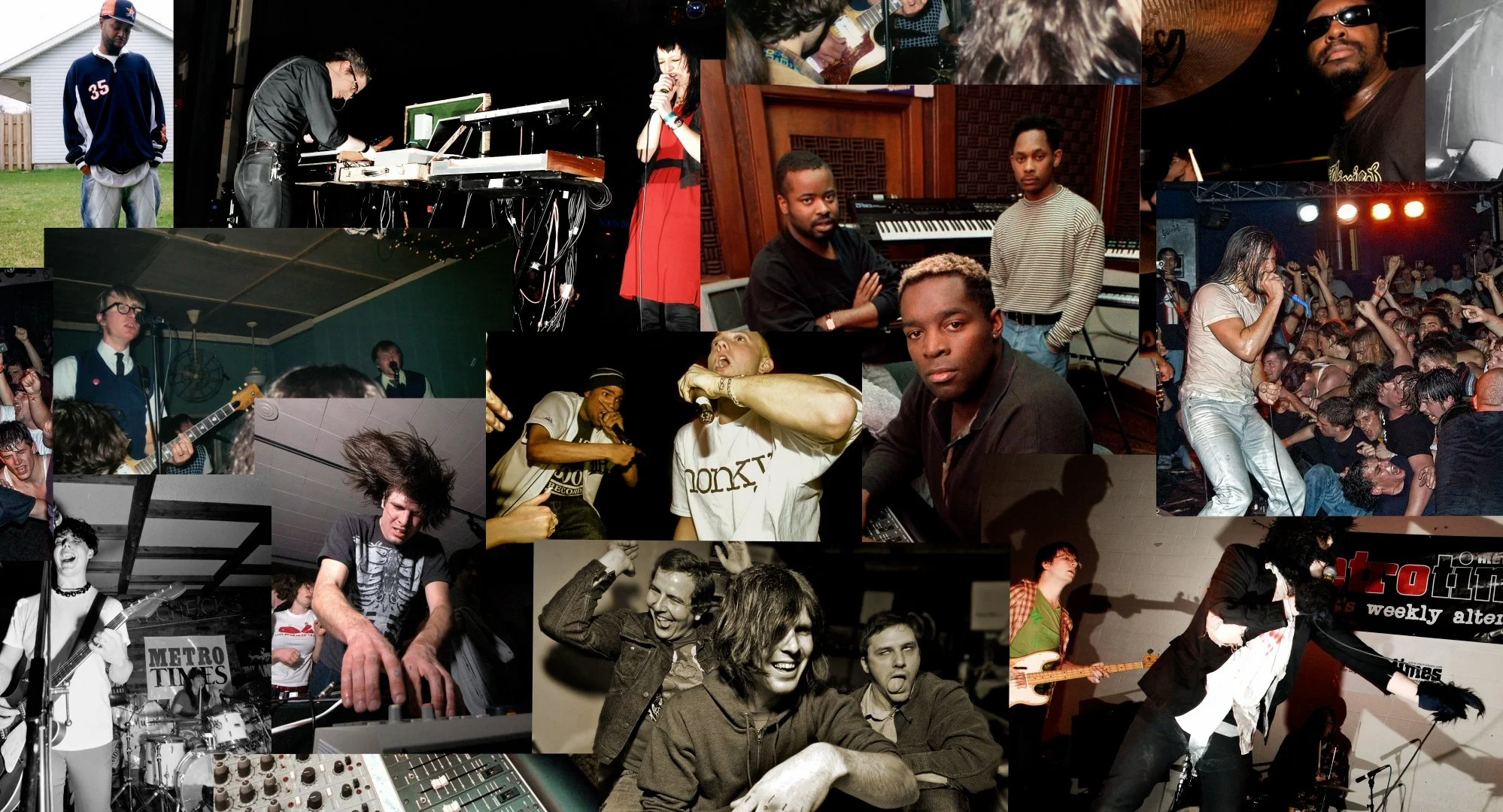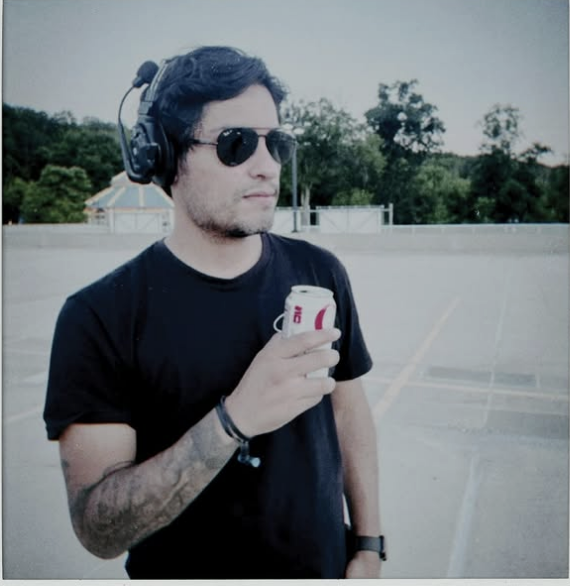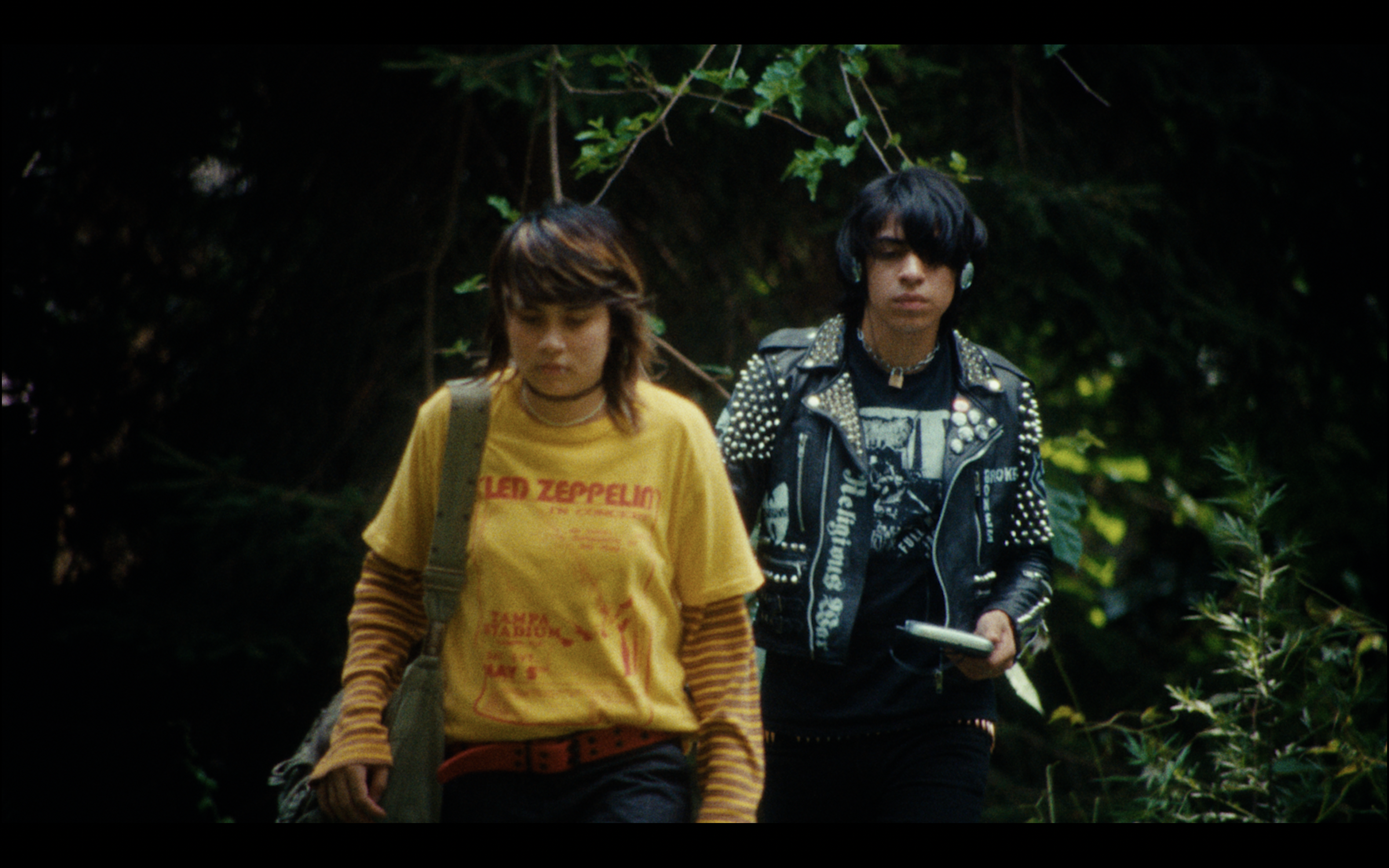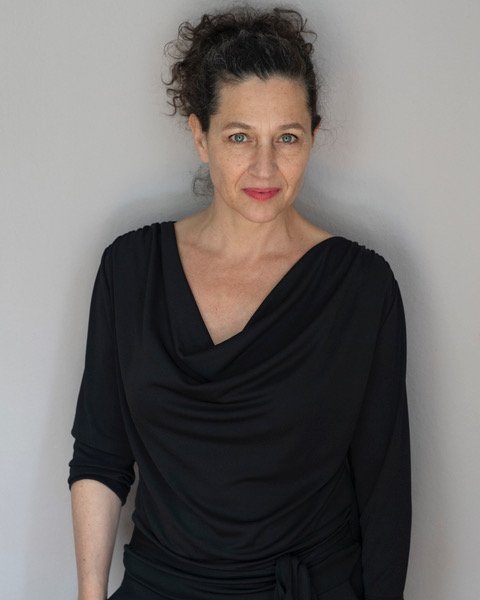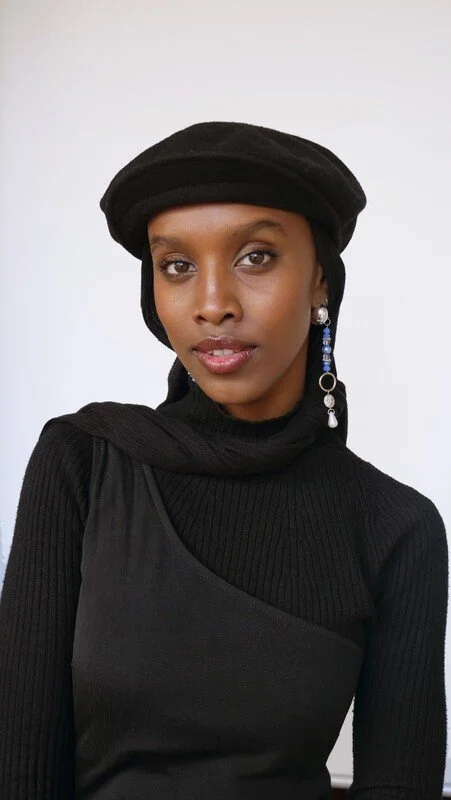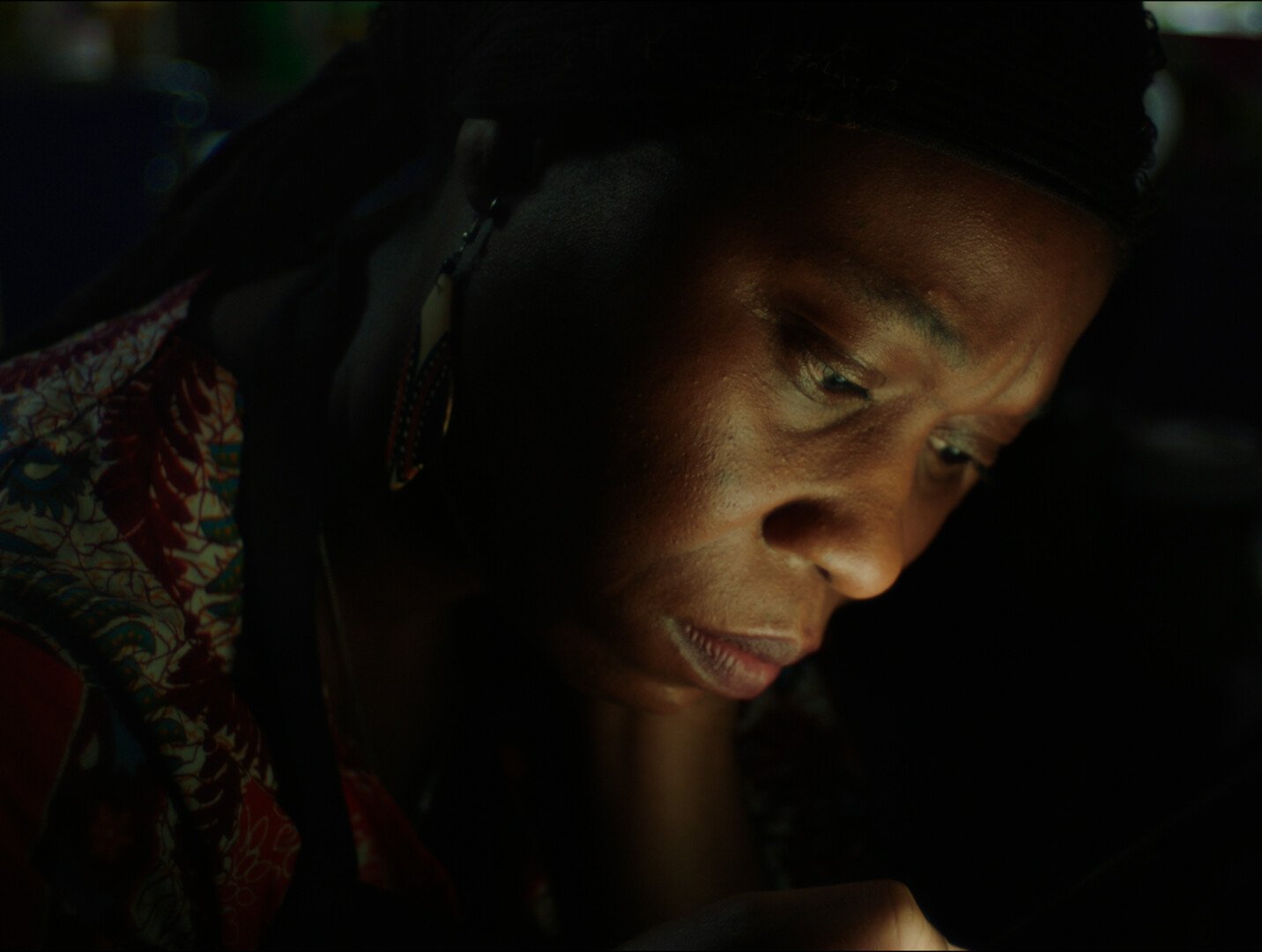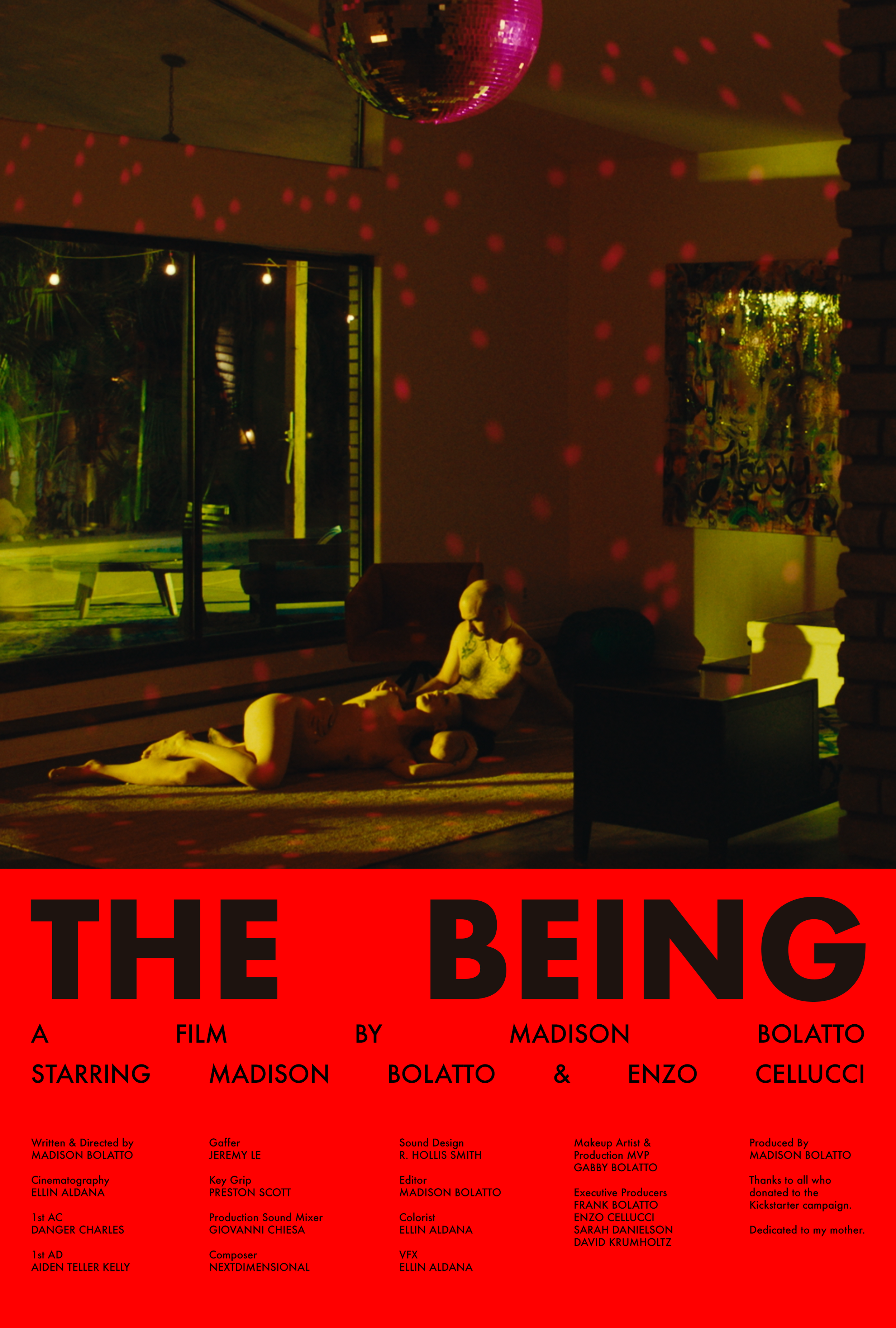Q&A with Filmmaker Ben See-Tho
Ben, a Filipino-Cantonese-German director from the Bay Area, earned his BFA at NYU Tisch. He co-directed Delicates with Kyle Petersen, screening at this year’s Bushwick Film Festival.
Ben See-Tho
Ben See-Tho is a Filipino-Cantonese-German director from the Bay Area who earned his BFA in Film & TV from NYU Tisch. His work has been featured by GRAMMY U and Asian Cinevision, and he is the founder of ORANGEJUUZ, a boutique production company. With a background in dance and music, Ben infuses playfulness and unconventionality into his filmmaking. The short film Delicates he co-directed with Kyle Petersen will be screening at the Bushwick Film Festival this year.
This Q&A is part of the Bushwick Film Fest Filmmaker Q&A series
Delicates (2025)
What was your favorite part of making your film? Memories from the process?
Shooting the dance scene was such a joy. Neither Kelly or Henry (our leads) had much dance experience prior; to see them nail that scene not only as actors, but as burgeoning dancers was so gratifying. There was an electricity on set– every single crew member was glued to the monitor, rooting for them. It was epic.
What was a big challenge you faced while making this film?
Our two main characters spend most of the story physically separated, which led to our dialogue scenes playing out more like phone calls than traditional conversations. In practice, this meant Kelly or Henry were often acting without a direct counterpart, with the other side of the conversation being read off camera. One particular scene actually consisted of the two characters’ coverage shot months apart! We had to schedule it that way to catch the changing of the seasons– we wanted the audience to feel the passage of time. Making sure the performances felt cohesive despite that was a holistic challenge, we couldn’t have done it without combined efforts from both our actors, directors, and editor.
Tell us an anecdote about casting or working with your actors.
Kyle (my co-director and writer) and Henry (who plays Colin) have been some of my closest friends and collaborators for more than a decade now. We were forged in the same high school theater, and at this point for us, creatively synergizing is second nature. So when it came to casting Megan, we needed to find someone who was not just compatible with our style but more importantly injected us with fresh energy. When Kelly came to the first screen test, there was an instant feeling that she raised the bar for all of us, while also somehow feeling an old friend, fitting into the dynamic perfectly. When she left the room, we didn’t even need to say anything, we just nodded to each other and wordlessly agreed.
Were there any films or directors that influenced your approach to this project?
Kyle and I both have a deep affinity for music and the way it intersects with story. My directorial work outside of Delicates primarily consists of music videos, so when we were developing the short, we used temp music as a guiding light in an Edgar Wright-y kind of way. There was a particularly formative playlist of temp music that shaped the film from the writing stage all the way through editing, and somehow most of the instrumental tracks on that playlist were from the Wall-E soundtrack. We both ended up rewatching it around this time, and something about the big-hearted yet fragile relationship at its core and the oblique magical feelings of the score really rubbed off on us.
What inspired you to pursue a career in filmmaking?
My initial pursuit is a longer story, but I can definitely speak on what inspires me to keep going! Directing is never monotonous and rarely isolating– each project is a little village, with new faces, different stakes, and fresh challenges. I love getting to know people by working with them. Every set has so many memories, and the final product crystallizes our collective experience from that time.
Early bird or night owl?
NIGHT OWL
This Q&A is part of the Bushwick Film Fest Filmmaker Q&A series
Q&A with Filmmaker Claire McClain
Claire McClain is a queer bi-coastal actor, multidisciplinary artist and filmmaker, based in Los Angeles. Claire is the writer/producer of Riis, which is screening at the Bushwick Film Festival this year
Claire McClain
Claire McClain is a queer bi-coastal actor and multidisciplinary artist based in Los Angeles. Originally from Missouri, Claire discovered acting through James Cagney films and pursued it with determination, earning an MFA in acting. They have since built a dynamic career, appearing in national commercials, voiceover campaigns, theatre, a feature on Apple TV, and award-winning shorts. Known for blending grit with wit, Claire brings authenticity to both dramatic and comedic roles. Expanding into filmmaking, Claire is the writer/producer of Riis, which is screening at the Bushwick Film Festival this year.
This Q&A is part of the Bushwick Film Fest Filmmaker Q&A series
Riis (2025)
What inspired you to create this film, and how did the initial idea come to you?
I was inspired to make this film years ago when there was talk about building a luxury hotel at Jacob Riis Beach. There was a lot of fear about how this would change the acceptance of queer people at the beach and in general push people out. Riis is as eclectic as it is inclusive so it makes it hard to describe. I thought if this ever goes away, how will we explain what we had here? This space that for decades has been a haven for LGBTQ+ and BIPOC communities. I knew it had to be preserved, I knew it needed a narrative structure, because it's just how we get other's invested--narrative. AND, truly I wanted to do a Robert Altman's Nashville style film with the real people at the beach, but the budget and timeline would have been so insane haha. But that was the initial idea.
Why does this story need to be told now?
*gestures broadly*
Describe who you want this film to reach.
Everyone. But to be honest this one was for queer people. I am big on teaching and advocacy inherently has to reach someone that doesn't agree for it to be effective, but queer people need a way to exhale. This is something to take the edge off and hopefully keeps us going, you know? Reminding us of what we are trying to protect. It can get so dark when we see ourselves in films. I want us to have dumb comedies. To remember laughter and how it feels to be in community.
What do you hope audiences will take away from watching your film?
I tried not to preach too hard in this film or it would feel yuck and not be funny. But I definitely want them to see that Riis is soooo special. Truly. Know that it exists for them. Then, you know, I float softly, a message about not putting off your life just because it's not the perfect conditions for it. It's in the interaction between Rowan and Casey, when Rowan talks to Casey about top surgery as a way to approach Casey about this sort of perfectionism--that frankly is making Casey like not see things clearly and miss opportunities for connection. It's why community is important. Having people that can accept you when you have trouble accepting yourself. Invaluable.
How do you want people to feel after they see your film?
What I hope is that they laughed in a room with people. There is great value in that. I hope they feel seen and called out in a fun lighthearted way that just makes whatever they're carrying lighter.
What was the biggest inspiration behind this film?
The people I know. So many very talented queer people in filmmaking that I think deserve to work in this industry. I pushed so hard for this project because there were so many people that I wanted to have the chance to work on something that they had a really clear perspective on.
What was your favorite part of making your film? Memories from the process?
Oh my god. Our shoot rocked my ass off. That was the most fun I have ever had on a set. We were so prepared and were able to wrap early on our second day. Everyone stayed and swam in the ocean together and like WATCHED THE SUNSET?!? It was so beautiful to have a moment to just like appreciate each other and our work. And Riis!
What was a big challenge you faced while making this film?
Everything. Our pre-pro was a hell. haha. Permitting in particular. We couldn't pin down a shoot date without the permits. That created scheduling issues with cast and crew. It was hard won, but so worth it. I'm glad we didn't give up. The beach presents it's own challenges as a shooting location. Weather--we almost cancelled the shoot the week before because of an expected storm. Thank god we didn't because the storm didn't happen. Just a lot of elements were in the air.
Tell us an anecdote about casting or working with your actors.
I wrote everything for the main characters with the actors you see in mind. That way people could improvise more and the dynamics were organic. Things could flow.
Were there any films or directors that influenced your approach to this project?
I think a lot of 90s rom-coms. I already mentioned Nashville. Stand by Me is probably somewhere in there--story about the firm foundation of friendship.
What inspired you to pursue a career in filmmaking?
I have loved watching movies since I was a kid. Sometimes it would feel like the film reached something in me that I couldn't grasp. Watching films gave me language for experiences that were really difficult growing up. It would be a little tough at my house. As I have gotten older, that yearning for something to reach me has evolved into a need to reach out.
Why is filmmaking important to you? Why is it important to the world?
I think the above. But a good film helps people see others better. It has a huge capacity to change perspective and the medium itself has revealed to us so much about the brain and human perception. If you can be really dedicated to the task, I think a filmmaker can connect disparate factions. Make people feel whole, connected, less alone.
What role does technology play in your filmmaking process, and how has it evolved over the years?
I have no idea.
What is something that all filmmakers should keep in mind in order to become better cinematic storytellers?
I'm still learning. But the Kuleshov effect is so instructive. I don't care if it's like filmmaking 101. The audience should not be thought of as passive. Our minds fill in gaps naturally. So, I think anywhere that you can leave room for the audience to do some processing, the impact will be greater. Don't do their thinking for them.
Films are lasting artistic legacies; what do you want yours to say?
Everyone should get to enjoy the sun and the ocean without fear.
If you weren’t a filmmaker, what would you be doing?
Everything I do now - minus the filmmaking haha. I have a lot of passions and they all feel weirdly connected to the same impulse to make films. I paint, I write music, box, teach and build things. I always have like 10 projects. It drives my girlfriend nuts, but you know she loves me -- keeping things interesting!
How do you approach storytelling in your films? What’s your process for developing a script or concept?
Oh, everything is like I'm writing a personal letter to someone I know. Writing is like: "I have a message. I'm sending it right to this person and I need to give this context for the message to come in clear." The genres are like for me to be understood. The environment of the film are to connect the wider world to the story.
What’s your history with the Bushwick Film Festival?
I think I was in a short that went to BFF. It was called "Perfect as Cats." It's a great fest! Thanks for including us!
Can you talk about the festival experience? How does it feel to have your film selected?
So flattering and honored.
How do you feel about your film being screened in front of a festival audience?
It's hard to enjoy a comedy on your own. It needs an audience to really live.
What’s the last film you watched?
Watched Parasite and She's the Man the other night.
What’s the last book you read?
"Man and His Symbols" by Carl Jung.
One thing people don’t know about me is _____.
I am arab-american.
Early bird or night owl?
I have been both and can be both.
What three things do you always have in your refrigerator?
Baking soda, hot sauce, hummus.
This Q&A is part of the Bushwick Film Fest Filmmaker Q&A series
Q&A with Filmmaker Mekhai Lee
Mekhai Lee, Charlotte-born filmmaker and HBO Succession Fellow, created For the Boys and NAACP-winning short Them That’s Not.
Hailing from Charlotte, North Carolina, Mekhai Lee is a proud graduate of the Drama program at the University of North Carolina School of the Arts. He acted in professional productions, including Broadway’s The Color Purple. He is the writer/director and co-creator of the acclaimed web series For the Boys. A member of the Half-Initiative Director Program, he was HBO’s Succession 2022 Director Fellow. His short film Them That’s Not premiered at NewfestPride ‘25 and screened at multiple festivals. He is also a 2025 NAACP Cinematic Shorts Competition recipient and directed Keyon Monte’s play NHeaven.
This Q&A is part of the Bushwick Film Fest Filmmaker Q&A series
Them That’s Not (2025)
What inspired you to create this film, and how did the initial idea come to you?
I set out to tell this story at the passing of my own grandmother when faced with how isolating grief in a family setting could be, especially for those who are closer to the deceased. I found connective tissue in that isolation amongst communities, i.e identifying as queer in your heteronormative family, identifying as Hard of Hearing in your entirely Hearing family… Thus, Billie Holliday’s song, “God Bless the Child” commissioned to this film by Concord Publishing and Newfest Film Festival, became the quintessential tune to bring this film to life. “God Bless the Child” heralds that isolation, and I was keen on flipping the message of the song to be one that instead reminds its listener of trusted community. That “our own” can rest in those around us whom we love.. even if they’re the most unexpected source of solace.
What do you hope audiences will take away from watching your film?
I hope that audiences will be reminded of the necessity of trusted community. Too often I hear stories of people relying on hyper independence and pure will to achieve their goals, and I wanted to make a film that challenged the notion of that. I want audiences to be reminded that it is okay to need people and to need community; in fact more than okay, it is utterly necessary for our survival.
Tell us an anecdote about casting or working with your actors.
One of my favorite memories was learning Black ASL in between setups. I can recall the interpreters, Director of Artistic Sign Language and my lead actress conferring in a corner signing away. When I made my way over they started teaching me, after I’d already been in formal ASL classes, some informal signs in Black ASL, which is a language completely independent of ASL. It was hilarious and fun and one of my favorite memories from the shoot.
Were there any films or directors that influenced your approach to this project?
I was inspired by two films in particular for this film; The Last Black Man in San Francisco for its visual approach and consideration of time and space. I love how that film feels no need to rush its story, and I wanted a similar tone in my film, especially considering the “listening” aspect overarching the entire piece. And the second film that was a main inspiration for me was “The Sound of Metal,” particularly in its sound design and Deaf representation. Sound of Metal drops you directly into the POV of its protagonist and I wanted to have that same approach to Drea from an audience perspective.
What’s the last film you watched?
Portrait of a Lady on Fire
What’s the last book you read?
Best book I read this year is a sci-fi/fantasy narrative called The Will of the Many by James Islington, HIGHLY recommend.
Early bird or night owl?
Night Owl.
This Q&A is part of the Bushwick Film Fest Filmmaker Q&A series
Q&A with Filmmaker Amelia Annen
NYC filmmaker Amelia Annen, an NYU graduate, has award-winning shorts and pilots; she begins production on her first feature this summer.
Amelia Annen is a filmmaker based in NYC. She received her BFA in Theatre and Minor in Creative Writing from New York University in 2021. Some of her directorial credits include: Rural (Next Generation Indie Film Awards, Best Short Film + Best Director: October 2022 Gothamite Monthly Film Awards), Angel (Best Comedy Short Film: ISTANBUL FILM AWARDS), Girl of My Dreams (Best Student Film: FROSTBITE Int. Indie Fest July 2021 and Best Student Film: Art Film Award July 2021). Her pilot "A-Team Lovestruck" was a Second Rounder at the Austin Film Festival, and she is making her first feature this summer with her writing partner, Maxine McCormick.
This Q&A is part of the Bushwick Film Fest Filmmaker Q&A series
Heaven Help me (2025)
What do you hope audiences will take away from watching your film?
A good laugh, honestly. This film doesn’t conquer any major societal issues, but every day I wake up, and I feel like the world is slowly dying, and I’m sure other people feel the same way. So I hope people can laugh, ideally with a friend.
What was a big challenge you faced while making this film?
I wrote Heaven Help Me after what I think was nearly two years of major writer’s block. Obviously, I wrote some things, but they were all terrible. So this was a fun break from feeling completely uncreative. The first thing I came up with was that a priest was listening to a woman talking about her dreams. Everything else came later. It took me months to write this script, and it’s pretty simple…so that was how bad the writer’s block was.
Were there any films or directors that influenced your approach to this project?
Watching back Heaven Help Me back in post-production, I can see my love for witty British TV and Films sneaking its way into my writing. It almost feels like a lost plotline from Love, Actually or something. Similarly, there’s obviously a major Fleabag reference going on here. I tried to make it different, but I do just love Fleabag, and you can totally see that.
What inspired you to pursue a career in filmmaking?
My mom showed me many golden age movies as a kid, and it definitely gave me a complex that I knew way more about filmmaking and cinema history than my fellow middle schoolers. At the same time, I would make American Girl doll movies with my friends where we’d do the voices off-camera while the dolls sat motionless on screen – very low budget. I’ve been trying to make movies forever, but now I finally have a budget.
How do you feel about your film being screened in front of a festival audience?
Speaking of dreams, I have recurring nightmares where everyone watches my film, points at me, and says, “It’s terrible,” or that the Puritans will come for me and say it's sacrilegious. That probably won’t happen, so mainly I’m excited cause it’s silly, it’s fun, and I can’t wait to hear people laugh (hopefully).
This Q&A is part of the Bushwick Film Fest Filmmaker Q&A series
Q&A with Filmmaker Ashley Sengstaken
LA-based animator Ashley Sengstaken blends analog and digital techniques; her work spans Atlanta, The People’s Joker, The Eric Andre Show, and more.
Ashley Sengstaken
Ashley Sengstaken is a multimedia animator and artist based in Los Angeles, blending analog and digital techniques to explore the intersection of the girly and the grotesque. Her work has appeared in The People's Joker, FX’s ATLANTA, The Eric Andre Show, The Victoria's Secret Tour, Vans ads, and Hellavision.
She developed a Pepper’s Ghost animation and diorama technique during the IKEA Artist Residency, later expanding it for Ember Knight’s Dark Ride. Sengstaken has lectured on experimental animation and puppetry at the New York Film Academy and the Ojai Playwrights Conference. Her short film Girls Night Out is screening at Bushwick Film Festival this year.
This Q&A is part of the Bushwick Film Fest Filmmaker Q&A series
Girls Night Out (2025)
What inspired you to create this film, and how did the initial idea come to you?
I wanted to execute a very simple story with a very chaotic visual style. I thought the most accessible hero's journey with a beginning-middle-end structure is a night of binge drinking.
What was the biggest inspiration behind this film?
I wanted to convey the casual body horror that occurs when getting dressed. In my experience, it's always a battle between me and my dysmorphia, and I always find myself wishing I could take certain body parts and replace them with someone else's. I thought it would be interesting to have that come to fruition, but the ideal "hourglass" figure of the character is realized only by having a Frankenstein'd jumble of flesh in all the wrong places.
Were there any films or directors that influenced your approach to this project?
Not a filmmaker, but the visual artist Michaela Stark was a big influence. She's a designer/model/photographer.
What role does technology play in your filmmaking process, and how has it evolved over the years?
This is a digital animated film. A lot of my work is dedicated to replicating analog practices with digital tools (to save money!). This film was made in After Effects, Photoshop, and Adobe Animate. I did the initial digital collage pass of the character/background design, scouring the internet for editorials and stock images and Instagram posts to get the mish-mash texture right. Then, I painted/animated the shadows, highlights, and general lighting in a traditional 2D, cell-by-cell style. All of this was done with just me and my computer over the course of a year. But NO AI!!!
If you weren’t a filmmaker, what would you be doing?
I'd be a marionette puppeteer.
What’s the last film you watched?
So I Married an Axe Murderer
What three things do you always have in your refrigerator?
Hot & Zesty Pickles, frozen hashbrowns, beer
This Q&A is part of the Bushwick Film Fest Filmmaker Q&A series
Q&A with Filmmaker Oliver Moser
Berlin filmmaker Oliver Moser, a dffb graduate, debuts with The Color of Air after award-nominated screenplays and festival-screened shorts.
Oliver Moser
Oliver Moser is a writer and director from Berlin, Germany. He first studied Fine Arts with a focus on painting before discovering experimental film, which inspired him to pursue directing and screenwriting at the German Film and Television Academy Berlin (dffb). There, he created short films that screened at national festivals and on television. His debut feature, The Color of Air, premiered at Filmfest Hamburg, with its screenplay previously nominated for the prestigious Emder Screenplay Award, marking him as a rising filmmaker.
This Q&A is part of the Bushwick Film Fest Filmmaker Q&A series
The Color of Air (2025)
What inspired you to create this film, and how did the initial idea come to you?
When I was a kid, I knew these two best friends from my neighborhood. One lived in our sheltered suburb, the other came from a children's home on the outskirts of town. When they started getting into drugs and petty crime, the sheltered kid's parents stepped in and shipped him off to some elite boarding school abroad. The other boy lost his whole world. After a while, he tried to kill himself, then just disappeared without saying goodbye. I still wonder how he's doing today, and that's where this film started. It's about the people behind the walls and the ones standing outside them. The lucky ones inside get to look through clean windows and decide whether all that chaos outside is their business or not. The others depend on someone letting them in. And the walls that keep us apart send their shadows in all directions.
What was a big challenge you faced while making this film?
We're telling the story of four people trapped together, and you should never be too sure who's actually right, because they all are, in their own way. My team and I knew this would be challenging, but we had no clue how brutal it would get. Even the slightest preference for one character would upset the balance of the whole thing. The audience would latch onto it while they're trying to piece together what really happened. So we were constantly juggling, making sure each viewpoint got their fair share. We already had headaches during the writing process, but filming is where it became a real fight because now you've got this camera that keeps wanting to pick sides.
Were there any films or directors that influenced your approach to this project?
At some point while we were writing, my co-author handed me this coffee mug with "What would Farhadi do?" printed on it. So, yeah, Asghar Farhadi had a big influence on us. I love the way he approaches complexities, and how he cuts off one interpretation of an event just to give room to an another, that feels totally legitimate in its own subjectiveness. That's when drama gets really exciting for me.
What’s the last book you read?
Imperium by Christian Kracht
What three things do you always have in your refrigerator?
Cheese, garlic, peanut butter (yes yes, I feel the need to keep that in the refrigerator)
This Q&A is part of the Bushwick Film Fest Filmmaker Q&A series
Q&A with Filmmaker Shareina Chandler
French Caribbean-born filmmaker Shareina, also an award-winning copywriter, blends global perspective, wit, and humor in her storytelling across mediums.
Shareina Chandler
Shareina is an award-winning copywriter by day and a writer/director by night. Born in the French Caribbean, she has lived in London, Paris, and now calls the U.S. home. She has worked as a freelance writer and most recently at Wieden+Kennedy, the renowned creative advertising agency in Portland. Passionate about storytelling across mediums, she brings wit, humor, and a global perspective to her work. Beyond her professional life, she is a lover of toast and an unapologetic hater of carpet.
This Q&A is part of the Bushwick Film Fest Filmmaker Q&A series
No Black Dancers in Portland (2025)
What inspired you to create this film, and how did the initial idea come to you?
In 2023, I fulfilled one of my life long dreams and started my pole dancing journey. I had images in my head of being FKA Twigs, gracefully sliding down a pole. I discovered two things very quickly: gracefully sliding down a pole is really hard, and the pole dancing community, the wider dancer/stripper world is very white. Atleast in Portland. It made sense but I was still surprised (mostly about the White pole dancing community thing, my of lack coordination, less so). I had been to strip clubs in the past but always in other cities; always with predominantly Black and Brown bodies on stage. I took another class, this one taught by a Black and Korean woman whose Mom had danced in strip clubs for years. In a sunlit, post pole stretch session, she talked about her experiences as a woman of color in this world. The ups, and the downs. It made me realize there were Black and Brown women out there. It’s just we haven’t really heard from them yet. My film was an attempt to right that wrong.
What do you hope audiences will take away from watching your film?
That every preconceived notion you had about these dancers is wrong. They're smart, funny, interesting and all around badass humans.
What was your favorite part of making your film? Memories from the process?
I love shooting movement so just shooting our cast as they played around the pole was really special. They're all really talented dancers and I loved watching them flow without any restraints.
What’s the last book you read?
The latest Emily Henry romance novel
Early bird or night owl?
Early bird
This Q&A is part of the Bushwick Film Fest Filmmaker Q&A series
Q&A with Filmmaker Max Scherr
Max Scherr, Russian-born director and Harvard graduate, creates films, music videos, and screenplays, drawing on seven years of production experience.
Max Scherr
Max Scherr, a director from Russia. I am a 2021 Harvard College graduate in Visual & Environmental Arts with 7+ years in film production. I've done it all — from feature film screenwriting and live show production to assistant camera work and directing. I have an ultimate portfolio consisting of multiple music videos, numerous screenplays of various lengths, short films and other productions. I feel comfortable leading a team of creatives, bringing the best out of the people to realize the vision — whether it is my own or someone else's.
This Q&A is part of the Bushwick Film Fest
Hodge-Podge (2025)
What do you hope audiences will take away from watching your film?
We don't need language to understand each other.
Tell us an anecdote about casting or working with your actors
I put up a bunch of flyers in New York's Chinatown, translated into Mandarin, looking for an inexperienced actor. You see, I wanted an authentic person who actually couldn't speak English, but could give me that real, raw performance. One person reached out. Still using the translator, I scheduled a time for an audition. He came in and suddenly a big problem presented itself — we couldn't understand each other. So I guess we do need language after all.
Why is filmmaking important to you? Why is it important to the world?
It's a vanity thing.
How do you feel about your film being screened in front of a festival audience?
Terrified!
What three things do you always have in your refrigerator?
Greek yogurt, berries and salmon.
This Q&A is part of the Bushwick Film Fest Filmmaker Q&A series
Q&A with Filmmaker Kelli Miller
Kelli Miller, creative director of And/Or Studio, debuts with Is That All There Is?. Her design credits include films by Reichardt and Hittman.
Kelli Miller
Kelli Miller is a director, creative director, and owner of And/Or Studio. She has designed title sequences for films by Kelly Reichardt, Eliza Hittman, Mariama Diallo, and Laura Poitras, and directed documentary graphics for White Hot and Heightened Scrutiny. Her commercial work includes projects for FX, CBS, Paramount, and Spotify. With a background in design and storytelling, Miller brings a distinct creative vision to her filmmaking. Is That All There Is? marks her debut as a director.
This Q&A is part of the Bushwick Film Fest Filmmaker Q&A series
Is That All There Is? (2025)
Why does this story need to be told now?
2000’s nostalgia is having a moment and Detroit, ever the underdog, should be a part of that narrative. People are interested in examining what the turn of the century had to offer and looking at it through the lens of now, which is so incredibly different from then that it almost feels fictional. Back then, a culturally curious person had to find their kicks through physical artifacts by accessing an underground network of like-minded weirdos. Now, we live in an era where a thirty second TikTok can launch a musical career and young people have had access to entire cultural histories at their fingertips since they could hold an iPhone. The meaning of “success” has become even more ingrained in the trappings of capitalism than ever. This film shows that there’s more to leading a creative life than achieving fame and fortune; the real value is in the process of making something you’re proud of, the person you become as a result of that act and the community you build along the way.
How do you want people to feel after they see your film?
The Trembling made me who I am today. Being a part of a DIY community in an apathetic city gave me both the confidence and ignorance to follow other dreams, like starting a design and production studio in Brooklyn, or trying to make a film. This experience of putting my creative work before material success has been an invaluable lesson in what it means to lead a creative life that doesn’t adhere to mainstream values and definitions of success. I want to share that story with people so they can find their own nontraditional ways to make this world a less sucky place.
What’s the last film you watched?
City of Lost Children
What’s the last book you read?
The Colony by Annika Norlin
One thing people don’t know about me is _____
I'm pretty much an open book, if you don't know something just ask!
Early bird or night owl?
Early bird
What three things do you always have in your refrigerator?
Seltzer, Fage 0% Yogurt and Eggs
This Q&A is part of the Bushwick Film Fest Filmmaker Q&A series
Q&A with Filmmaker Carlos Cardona
Carlos Cardona, Colombian-American filmmaker from New York, directed Sundance standout Chiqui and creates narrative and documentary work exploring identity.
Carlos Cardona
Carlos Cardona is an award-winning Colombian-American director and cinematographer from Southampton, New York. With over a decade of experience in narrative and documentary filmmaking, he has directed two feature films and shot numerous feature documentaries and shorts. His work often explores identity, race, and class, examining how these themes intersect with American culture. Carlos wrote and directed Chiqui, which premiered at the 2022 Sundance Film Festival and was highlighted by multiple sources as a standout of the Indie Episodic Program, cementing his reputation as a distinctive filmmaker.
This Q&A is part of the Bushwick Film Fest Filmmaker Q&A series
Born 2 Lose (2025)
What inspired you to create this film, and how did the initial idea come to you?
"Born 2 Lose is inspired by my personal experiences growing up punk in the Hamptons and New York City during the mid-2000s.
Why does this story need to be told now?
This story needs to be told because Latino American and genuinie punk representation is sorely lacking in Film and TV. .
Describe who you want this film to reach
Punks, teenagers, millennials, and really anyone who’s ever experienced the chaos and intensity of being a teenager.
What do you hope audiences will take away from watching your film?
A deeper understanding of both the punk experience and the realities of growing up as an immigrant child in the USA
How do you want people to feel after they see your film?
I want the film to spark nostalgia, while also encouraging people to reflect on their own teenage years and the many archetypes that defined the high school experience.
What was the biggest inspiration behind this film?
My best friend Brian Mullarkey who this film is dedicated to.
What was your favorite part of making your film? Memories from the process?
My favorite part was witnessing my lived experiences reborn on screen, as if resurrecting the ghosts of my past and giving them new life
What was a big challenge you faced while making this film?
Making an independent film is always a struggle. Beyond the obvious budget limitations, the real challenge was balancing authenticity—telling the story as truthfully as possible—while avoiding the trap of romanticizing my own experiences. At the same time, I had to keep a critical perspective on the story and make it practical to shoot within the parameters of our production.
Tell us an anecdote about casting or working with your actors.
While shooting a scene on St. Marks Place in the East Village—a spot I used to hang out at as a teenager—I had a surreal encounter. A punk from my past was sitting on the steps of Search and Destroy, and one of the actors, without realizing it, sat down right next to him during the take. When I yelled ‘cut’ and walked over, he looked at me, then at the actor, and he couldn’t believe what he was seeing. We hadn’t crossed paths in almost twenty years, and suddenly he was face-to-face with actors portraying people we once knew. It was an uncanny, almost ghostly moment for both of us.
Can you tell us about the central themes of your film? What message or emotion did you hope to convey?
Most of the central themes in Born 2 Lose explore the Latino American experience, particularly the challenges of growing up within white culture and the different pathways immigrant children take to assimilate into a language and culture unfamiliar to their parents. The film also examines the politics of punk rock, the social hierarchies of American high school cliques, and the shifting dynamics of youth culture at the dawn of social media and the internet.
Were there any films or directors that influenced your approach to this project?
Born 2 Lose draws heavy inspiration from Larry Clark’s Kids and American social realism that emerged in the 1990s and early 2000s.
What inspired you to pursue a career in filmmaking?
I grew up an onlu child obsessed with movies. Horror was my introduction to cinema when I discovered the power that cinema had to influnece human emotions with not only fear but empahthy, compassion and love acorss many genres and expressions through film.
Why is filmmaking important to you? Why is it important to the world?
Filmmaking is important to me because it allows me to shape my own reality. Every film I make feels like a rebirth—a second chance to explore an alternative reality that I can curate, whether through the stories I tell or the images I capture. I believe cinema is one of the most important art forms because it influences us in ways other mediums cannot. It serves as both a mirror of society and a visual time capsule of world history, reflecting the values, struggles, and cultural norms of its era.
What role does technology play in your filmmaking process, and how has it evolved over the years?
don’t consider myself a purely technical filmmaker, though I deeply appreciate the methods and technologies of cinema’s pre-digital history. At the same time, filmmaking inevitably requires a relationship with constantly evolving tools—cameras, lights, editing software, and beyond. While most of my work is digital, I strive to carry forward the spirit of celluloid filmmaking by dialing in my look in-camera, using filters, specific lenses, and lighting philosophies that honor an older tradition.
What is something that all filmmakers should keep in mind in order to become better cinematic storytellers?
I try to follow the words of Gordon Willis: “Keep it simple.” A great story—no matter how complex—should be easy for audiences to follow. I believe cinema is ultimately an emotional art form rather than a cerebral one.
Films are lasting artistic legacies; what do you want yours to say?
It’s hard to say, because I’m still learning and building my own legacy. But ultimately, I want to leave behind a body of work that Latino American kids like me can connect with—a body of work that shows our stories are important, and that they deserve to be told.
If you weren’t a filmmaker, what would you be doing?
Film historian.
How do you approach storytelling in your films? What’s your process for developing a script or concept?
I have different approaches to the kinds of films i like to make. In the last five years I have been focused on personal stories, so aggregarting anecdotes and poignant personal experienes and turning them into storires is my main focus. The hard part is not romanaticsizng your own experiences and looking at them thrugh a crtiycal lens. To quote Joyce, "In the person is the universal"
What’s your history with the Bushwick Film Festival?
I’m an alumni of the Bushwick Film Festival. The precursor to Born 2 Lose, titled Chiqui, won Best Web Series in 2022, and Dreams & Schemes—a film I co-directed and shot—won Best Web Series in 2024.
Can you talk about the festival experience? How does it feel to have your film selected?
It’s always a pleasure and a privilege to be selected, especially since Brooklyn is my home base and my most beloved place in the world
How do you feel about your film being screened in front of a festival audience?
I still get nervous about screening my films in front of an audience, but I always cherish the communal experience of watching a film together. For me, that collective energy is at the core of cinema as an art form.
What’s the last film you watched?
Interiors (1977)
What’s the last book you read?
Easy Riders and Raging Bulls
One thing people don’t know about me is _____.
I love musicals.
Early bird or night owl?
Both.
What three things do you always have in your refrigerator?
Film, NA Beers, Film
This Q&A is part of the Bushwick Film Fest Filmmaker Q&A series
Q&A with Filmmaker Delia Mayer
Delia Mayer, Swiss director, producer, and actor, debuted with $HARE’s pilot. Known for Netflix’s Unorthodox, she’s performed worldwide.
Delia Mayer
Delia Mayer, director, producer, actor, and singer, was born in Hong Kong and raised in Zurich, Switzerland, where she currently lives. She studied acting and singing in New York, London, Vienna, and Zurich. Delia has performed in lead roles on stage, film, and TV across Europe, the UK, Israel, and the U.S. She appears as Miriam Shapiro in Netflix’s Emmy-winning Unorthodox and in The Tattooist from Auschwitz and The World Divided. She made her directorial debut with the pilot of $HARE, executive produced by Rhea Seehorn.
This Q&A is part of the Bushwick Film Fest Filmmaker Q&A series
$HARE (2025)
What inspired you to create this film, and how did the initial idea come to you?
We keep seeing stories about wealth inequality everywhere, but rarely do we see anyone on screen wrestling with how to fix it from the inside. We realized if you can't see it, you can't be it. So we created Lena: someone who inherits a mining empire and thinks, "Actually, this system is broken - how do I fix it?" Because honestly, we need alternatives to the Musk-Bezos playbook, and maybe those alternatives might come from women who've been taking notes all along.
Why does this story need to be told now?
We desperately need alternatives to the current system where wealth concentrates at the top while everything else falls apart. Also, every time we pitched this story, someone said "make the protagonist younger" - which told us everything we needed to know about why this story matters.
Describe who you want this film to reach
People curious about alternatives to "profit at all costs" capitalism. And anyone who thinks campsite living in the Swiss Alps looks like the perfect revenge against corporate life.
How do you want people to feel after they see your film?
Entertained and tempted to research new economy models and ownership structures. We want them laughing (and crying) at the family dysfunction while secretly planning their own corporate rev6olution. Basically inspired to do what our hero does - to go out there and change things.
What was the biggest inspiration behind this film?
Real women like MacKenzie Scott and Marlene Engelhorn who are giving away fortunes with zero fanfare, plus every medieval manuscript about nuns who ran their own financial empires centuries before anyone thought women could handle money. History is full of women who figured out how to do wealth differently - we just don't tell their stories enough. And damn, do we need them right now!
What was your favorite part of making your film? Memories from the process?
Filming in sub-zero temperatures on a campsite while our Japanese catering team somehow created fusion masterpieces in a tiny campsite kitchen. Also, the moment we realized our "crazy" production model actually worked - equal pay, sustainable methods, collaborative decision-making - and we were making something beautiful without compromising our values.
What was a big challenge you faced while making this film?
Convincing industry people that women over 50 are worth watching (apparently this is controversial?). Plus, financing a story about dismantling capitalism when you need capitalist money to make it. The irony wasn't lost on us, but sometimes you have to work within the system to change it.
This Q&A is part of the Bushwick Film Fest Filmmaker Q&A series
Q&A with Filmmakers Clare Austen-Smith, Sofia Dobrushin
Brooklyn filmmaker Sofia Dobrushin, Ars Nova CAMP resident, directs and performs comedy-driven work uplifting queer, BIPOC, and female-centered stories.
Clare Austen-Smith
Clare Austen-Smith and Sofia Dobrushin are both Brooklyn-based comedians and filmmakers. Between them, they’ve had cameos on High Maintenance, been published in the New Yorker, been 2023 Ars Nova CAMP resident, performed in New York Comedy Fest, and more. This short film is their first artistic collaboration together.
This Q&A is part of the Bushwick Film Fest
The Release (2025)
What inspired you to create this film, and how did the initial idea come to you?
Clare: The idea essentially came to me fully formed. I had a note on my phone with the basics that I jotted down but I just knew how it began, how it ended, who Miranda was, everything. Rarely do ideas show up so fully formed like that, so I felt I had to honor it by making it. Sofia: The first time I met Clare we knew wanted to make something together. Having shit myself at Herald Square at one point in my life and going through that true chaos — as well as other gut health issues — reading the combination of the intense scenes and heightened comedic moments spoke to me.
What was your favorite part of making your film? Memories from the process?
Sofia: Arriving to the park to film and it was off leash hour and its what I assume "All Dogs go to Heaven" looks like. So many doodles in Carhartts. Clare: On our first day onset, we were shooting in a swanky apartment in Bushwick, and the toilet got clogged within two hours. A PA had to run out and buy a plunger.
What was a big challenge you faced while making this film?
Our biggest challenge was filming our scene with the prop gun. We had to get last minute insurance, patch together multiple locations, and get incredibly creative with Molly pretending to be holding the gun versus actually holding the gun when we could shoot with it. You can't tell right? Right?
Films are lasting artistic legacies; what do you want yours to say?
Sofia: A freak in the cinematic sheets. Clare: That I had a banging body and an amazing intellect.
Can you talk about the festival experience? How does it feel to have your film selected?
Sofia: Amazing. We filmed so much of our film here in Bushwick. I've really developed myself as artist while living in Bushwick for the last 9 years. Clare: It's really cool to be able to screen our film at a festival that takes place where we literally made it.
What three things do you always have in your refrigerator?
Sofia: Coconut water, expired probiotics, and food I forgot about. Clare: Tofu, iced coffee that has been brewing for so long it's lethal, and kimchi.
This Q&A is part of the Bushwick Film Fest Filmmaker Q&A series
Q&A with Filmmaker Mark Reyes
NYC filmmaker Mark Reyes, acclaimed for The Nightwalker at Fantasia, crafts surreal, mixed-media films screening at festivals worldwide.
Mark Reyes
Mark Reyes is a New York City-based filmmaker whose work blends surrealism and mixed media to create bold, genre-defying stories. His films have screened at festivals worldwide, including Fantasia, Fantaspoa, FilmQuest, Boston Underground Film Festival, Brooklyn Film Festival, and Bushwick Film Festival. His short The Nightwalker earned the 3rd Place Audience Award at Fantasia, cementing his reputation as a rising voice in independent cinema. Reyes continues to explore experimental approaches to narrative and visual storytelling, pushing boundaries in contemporary genre filmmaking.
This Q&A is part of the Bushwick Film Fest Filmmaker Q&A series
The House of Weird (2025)
What inspired you to create this film, and how did the initial idea come to you?
About 2 years ago I had been diagnosed with cancer, which is a situation that lies at the peak of uncertainty. From this experience I took a look at my life and realized I was treating it like a puzzle that needs to be solved instead of a thing that is meant to be enjoyed. No one knows what is going on and that is okay, I am just here to enjoy making cool stuff and spending time with my loved ones. There is no way out, I am already free.
Why does this story need to be told now?
We live in a very confusing time. We are so overstimulated with conflicting stories and ideologies in the modern day. People are very caught up int trying to force their or other peoples lives in a direction, when I believe the real purpose is to just enjoy the ride.
Describe who you want this film to reach.
I want this film to reach people like me who are feeling overwhelmed by everything going on as a reminder that they should live their life freely and enjoy the complex strange ride we are all on.
What do you hope audiences will take away from watching your film?
Be where you are!!!
How do you want people to feel after they see your film?
Relieved and empowered by the fact that the answers are inside of you!
What was the biggest inspiration behind this film?
A lot of surrealist art work. Trying to capture that dreamy childhood nostalgic feeling like you are up later than your supposed to be or you're looking for your mom at the mall.
What was your favorite part of making your film? Memories from the process?
I was recovering from major surgery and not working while making this film. I have a lot of fond memories just being at my desk in my pajamas working on the film all day, just drinking coffee and having fun with it all day. It felt like I was a kid doing arts and crafts!
What was a big challenge you faced while making this film?
I do everything solo! I love every second of it but between the creation of the film and submitting/attending festivals it is definitely a lot of work for one person.
Tell us an anecdote about casting or working with your actors.
Peter the faceless man has been my best friend and in almost every project I have ever done since I was 14. He most of the time doesn't even know what we are doing, I just put him in a costume and give him a loose idea of what to do and he kills it every time. This time, I said "think old infomercial" and he did that quick intro bit with these amazing animated motions perfectly on the first try.
Can you tell us about the central themes of your film? What message or emotion did you hope to convey?
I want to capture a feeling of lost, endless wandering, confusion, and frustration trying to solve a puzzle with no answer.
Were there any films or directors that influenced your approach to this project?
I watch a lot of animation. Patrick McHale from Over The Garden Wall, Pendalton Ward from Adventure time, Alex Hirsch from Gravity Falls. I love all those guys use of creative fun tales that still convey deep meaningful messages.
What inspired you to pursue a career in filmmaking?
I just liked playing with action figures as a kid. Being able to capture my imagination and use it to spread messages I think people should hear is a lot of fun for me.
Why is filmmaking important to you? Why is it important to the world?
No one likes to be lectured. I think if you can entertain someone, and then subtly slide some profound wisdom into that entertainment, you can really speak to people in a way that is digestible and communicative.
What role does technology play in your filmmaking process, and how has it evolved over the years?
I use a lot of new technologies in my work. I spend a lot of time at my editing station. As technology advances, I am just able to be capable of more by myself and not have to hire people that I can't afford to hire anyway. I love learning and implementing new skills, and technology just makes the gap of learning smaller every year.
What is something that all filmmakers should keep in mind in order to become better cinematic storytellers?
Don't focus on making stuff that's good, just focus on making stuff. To do it poorly is better than not doing it at all. Practice, practice, practice.
Films are lasting artistic legacies; what do you want yours to say?
Make cool shit. It's fun, spiritually rewarding, and anyone can do it if you put the time and energy in
If you weren’t a filmmaker, what would you be doing?
I teach martial arts as a day job. My martial arts fuels my filmmaking, my filmmaking fuels my martial arts. I need them both for different reasons, I think I would be lost if I only had one and not the other.
How do you approach storytelling in your films? What’s your process for developing a script or concept?
It depends. I usually just have a light idea or concept and then just kinda start going for it. I start making a prop, or a digital scene, or collect reference material. Anything to get the ball rolling. Making stuff is all about momentum to me, so I try to just jump right in right away and figure it out as I go along.
What’s your history with the Bushwick Film Festival?
It was recommended to me by a professor at Pratt Institute, where I went to film school.
Can you talk about the festival experience? How does it feel to have your film selected?
It is a huge honor. My family has been in Brooklyn for generations, so to have my work shown in such a prestigious festival in our home is really a huge honor. I love New York, it raised me so to be apart of the artistic lineage of this city is so cool to me.
How do you feel about your film being screened in front of a festival audience?
It is always so cool to see it on the big screen. A lot of stuff goes straight to online these days, so to see it in a theater always makes it feel like you made something special that isn't just a YouTube video or instagram post.
What’s the last film you watched?
Smurfs (it was terrible sorry)
What’s the last book you read?
The Kybalion
One thing people don’t know about me is _____.
I am a second degree black belt
Early bird or night owl?
unfortunately night owl I really wish I was a morning person but I don't think it is in the cards for me
What three things do you always have in your refrigerator?
protein bars, meat balls, spinach
This Q&A is part of the Bushwick Film Fest Filmmaker Q&A series
Q&A with Filmmaker Miski Omar
Miski Omar is a Somali-Australian filmmaker and writer exploring communication, identity, and culture, weaving clinical insight into compelling creative narratives.
Miski Omar
Miski Omar is a Somali-Australian speech pathologist, writer, and director based in Western Sydney. Her work in speech pathology, centered on language breakdowns and human connection, profoundly informs her artistic voice. Through film and writing, she explores the intricacies of communication, identity, and expression, weaving her clinical insights into creative narratives. Omar’s multidisciplinary practice highlights the resilience found in voices often overlooked, offering nuanced perspectives that bridge art and lived experience. She continues to shape stories rooted in language, culture, and community.
This Q&A is part of the Bushwick Film Fest Filmmaker Q&A series
Button Pusher (2025)
What inspired you to create this film, and how did the initial idea come to you?
The seed came in a writers’ room. We were shaping a story about a group of coworkers, and when a fight broke out in the story, someone suggested the two Black women turn on each other. The whole room agreed, without question. When I asked “why them”, the answer was, “because they’re sassy.” That default stuck with me. For Button Pusher, I wanted to flip that assumption on its head: instead of conflict, the two Black protagonists discover camaraderie, alliance, even joy. It’s part of my larger mission to create Black characters with dimension, characters who are flawed, funny, contradictory, resilient. Characters who get to be human, not shorthand.
What do you hope audiences will take away from watching your film?
Warmth. A kind of afterglow. If any prejudices rise to the surface, I hope they dissolve. And beyond that, I hope people walk away reminded that friendship, especially in unexpected places, is radical.
Tell us an anecdote about casting or working with your actors.
I was captivated by Bolude Watson after seeing her in Swift Street, an Australian TV show. She had that rare quality, you just wanted to be on her team, even when she was in the wrong. She was perfect for Abiola. The agents weren’t sure because it was a small production, but Bolude herself pushed for it. She wanted this role, which meant a lot to me. We finally locked her in a week out, with only two hours to rehearse over Zoom. We spent 15% on lines and 75% talking about female friendship, Blackness, and betrayal. That conversation became the backbone of her performance. You can feel it on screen: the lived-in texture of someone who has thought about these things deeply.
What inspired you to pursue a career in filmmaking?
I’ve always been a teacher, a noticer, a consolidator, that’s the speech pathologist in me. But film offered something more democratic. It collapses barriers. You don’t need literacy, a degree, or even patience for a 20 something-year-old’s ramblings to understand a story told with light, place, performance, and sound. It’s the most accessible medium. My mum, with English as a second language still quotes Scarface, “say hello to my little friend”, while showing me her new stick mixer. That’s the magic, cinema really enters the bloodstream of culture.
How do you approach storytelling in your films? What’s your process for developing a script or concept?
I root everything in human experience. My job in life is to be an experiencer, a purposeful voyeur. A night out with friends, a conversation in a waiting room, these become data downloads. My process is messy and playful: I brain-dump, I improvise scenes on long walks while pretending to be on the phone, I write fast and edit slow. I honor the spark and follow it until it either burns bright or fizzles out. And I’ve learned to let go when it fizzles, that’s part of the work too.
How do you feel about your film being screened in front of a festival audience?
Ecstatic. Festivals remind me that films have multiple lives. You edit one version, but in a theater, with an audience, it mutates. Unexpected things resonate. Strangers connect dots you never meant to draw. As a data collector, I love watching that process in real time. But more than that, it’s a chance to feel less alone. A stranger laughs, sighs, or nods at the same beat, and suddenly, something private becomes communal. I feel seen!
What’s the last film you watched?
Weapons. I jumped more than once. I’ve always found the scariest horror convention is when children or the elderly go rogue. They’re supposed to be innocent or fragile, the most vulnerable in society, so when they tilt toward menace, it scrambles your trust in the world. I also watched The Visit recently, same thing. Terrifying.
What three things do you always have in your refrigerator?
Hot sauce, because anything can be rescued with heat. Bread, because even the worst leftovers taste better between two slices and Kimchi! I love love love Kimchi. "Milk, tomato paste, and eggs."
This Q&A is part of the Bushwick Film Fest Filmmaker Q&A series
Q&A with Filmmaker Camila Grimaldi
Brooklyn filmmaker Camila Grimaldi, co-founder of Ser Nocturna, has award-winning shorts at Sundance, SXSW, and HollyShorts; 2023 Film Independent Fellow.
Camila Grimaldi
Camila Grimaldi (she/her) is an Argentinean-American filmmaker based in Brooklyn and co-founder of the production company Ser Nocturna with producing partner Arielle Friedman. She has directed music videos for clients including Atlantic Records and Switch Hit Records, and produced projects for Universal Music Group, Verve Music Group, Capitol Records, and Mischief Management. Her award-winning shorts have screened at Sundance, SXSW, Woodstock, and Montclair. As a director, her work has shown at HollyShorts, NY Latino Film Festival, and more. She is a 2023 Film Independent Producing Lab Fellow.
This Q&A is part of the Bushwick Film Fest Filmmaker Q&A series
Breadwinner (2025)
What was your favorite part of making your film? Memories from the process?
I loved every part of making Breadwinner. We were able to band together all of our most frequent collaborators and give them a chance to play with a whacky script about a blood-thirsty sourdough starter. One of my favorite moments on set came at the end of the second day — We were crunched for time and tackling a complicated practical FX shot where we had to make the sourdough starter monster crawl across a kitchen counter and “hold” onto one of our actor’s hands. It was all hands on deck trying to make that moment work on camera, and thanks to an ingenious use of a latex glove and two lines of fishing wire pulled by our PD Jaclyn and our writer Nicole (who was also art assisting and wearing many other hats), we pulled it off and wrapped on time.
Tell us an anecdote about casting or working with your actors
In classic short film fashion, one of our leads got sick just before the shoot and had to drop out. We were scrambling trying to think of who to cast less than a week before production, but luckily, Arielle and I had both worked with Taylor before, and he signed on within the hour and saved our film. He and Arielle already shared so much trust as scene partners that it made the rest of the process so smooth; We were able to rehearse the whole film and spend a lot of time on the climactic kitchen scene, pinning down the specifics of their relationship. I really can’t imagine it any other way now — Taylor strikes the perfect chord as the well-meaning but misguided boyfriend and the foil to Laila’s intense ambition.
Were there any films or directors that influenced your approach to this project?
It was always going to be tricky to strike a balance between all the elements we were juggling; We were making a monster-horror with a couple dynamic at its core and a cherry-on-top fantasy sequence. We drew inspiration from everything from classic monster movies like The Blob and Little Shop of Horrors to the Vogue 73 questions videos and Architectural Digest celebrity house tours (there is a special lime reference in the fantasy sequence for the eagle eyed). We also watched a lot at genre films and TV shows that hinge their story on the complexity of their characters, particularly their women, and there were always mentions of Pearl, Teeth, and Buffy the Vampire Slayer at our development sessions — They’re all in the DNA of the short.
Can you talk about the festival experience? How does it feel to have your film selected?
The festival submission process is brutal. It feels so vulnerable to put your work out there to be judged by others, especially when it sometimes feels like our entire career hinges on getting a yes from institutions that may have never heard of us. I’m so honored to have been selected to screen at Bushwick Film Festival, especially since Breadwinner was brought to life entirely in Brooklyn. I am so excited to watch the film with most of my cast and crew and honor all the time and work we put into it, and equally excited to watch the short films made by other filmmakers in my block. Making a film is so hard and sometimes you need to be reminded to slow down and celebrate the fact that you made it through to the finish line!
What’s the last film you watched?
I just watched Twinless! It’s so inspiring to see an independent movie like that carve a space for itself in theaters and prove that audiences are looking for fresh stories that can make you laugh one moment and move you to tears the next. James Sweeney is such a creative force and I can’t wait to see what else he makes.
This Q&A is part of the Bushwick Film Fest Filmmaker Q&A series
Q&A with Filmmaker Emma Josephson
Emma Josephson, queer filmmaker and AFI DWW+ finalist, creates surrealist stories like Bury Your Fish, screening at top festivals.
Emma Josephson
Emma Josephson is a queer screenwriter, director, and editor whose work explores the search for meaning in a chaotic world, often through a surrealist lens. Her award-winning films, including BURY YOUR FISH, have screened at festivals such as Beyond Fest, Tacoma Film Festival, Seattle Queer Film Festival, Atlanta Film Festival, and Dances With Films. A 2025 AFI DWW+ finalist, she also edits branded content and music videos. Recent projects include I FELT LIKE MAGIC and SEW INTO YOU, with new shorts and features in development.
This Q&A is part of the Bushwick Film Fest Filmmaker Q&A series
Perfomance Review (2025)
What inspired you to create this film, and how did the initial idea come to you?
Performance Review is inspired by my broken relationship with my estranged biological father. I’m the eldest daughter of a man who is an addict, narcissist, and psychopath. My dad lied, stole, and gambled away all our family’s savings. He forged my mom’s name on documents leaving her hundreds of thousands in debt all before I turned double digits. This script is inspired by a scenario I’ve played over and over in my head. What if my dad came back? After all this time what would he even want? Maybe he’d want this “job” back.
How do you want people to feel after they see your film?
I know so many people watching may have broken or non-existent relationships with family members in their lives choose their own selfish desires over caring for the people they should. And if you are a child of someone who did that, it’s okay to be angry and it’s okay to for you to shut down and have a million questions that you may never get answers to. And most importantly it’s okay if you choose to not fully forgive them to accept them into your life again if that’s what they are asking for. We are all adults who make our own decisions in attempt to do what’s best for us at any given time, so it’s okay to have boundaries and do what’s best for you to protect your peace moving forward.
What was your favorite part of making your film? Memories from the process?
My favorite part of making this film was the fact that it was shot on film in such a gorgeous house. We put a lot of thought and time into lighting these spaces and visually it turned out to be everything I dreamed of for this film.
Why is filmmaking important to you? Why is it important to the world?
Simply the pursuit of this career as a filmmaker has created such a rich and fulfilling life for myself. There is no finish line to cross and there’s never going to be a point where I’ve learned it all or perfectly executed a vision. All there is to do is keep trying. Every day I get to experience the extreme emotions, uncertainty, and excitement of making films in collaboration with other inspiring artists. The possibilities and opportunities to grow technically and creatively are infinite and will always continue to profoundly shape who I am as a person.
What’s the last film you watched?
I've been working on some other scripts, all in the physcological drama/thriller genre so I've also been trying to consume movies of similar styles and tones. The last film I watched was Black Bear (2020). Such and interesting and strange film.
Early bird or night owl?
Early bird for suuuuure! I love walking to a coffee shop first thing in the morning to plan the day, write or just get some to-do tasks completed. A few times a week I also hike up in Griffith park because there's alot of people out and it's so peaceful.
This Q&A is part of the Bushwick Film Fest Filmmaker Q&A series
Q&A with Filmmaker Lillie Wojcik Foster
Lillie Wojcik Foster, Brooklyn-based director, writer, and editor, crafts character-driven films exploring vulnerability, autonomy, and authentic human transformation.
Lillie Wojcik Foster
Lillie Wojcik Foster is a director, editor, and writer who believes the best stories begin with vulnerability. She started her career behind the scenes at production companies, collaborating on treatments, music videos, and commercials for other directors before shifting her focus to her own projects. Originally from Minnesota and now based in Greenpoint, Brooklyn, she creates character-driven, emotionally layered work. Her films often explore the tension between external constraints and emerging autonomy, reflecting her interest in authentic human experiences and personal transformation.
This Q&A is part of the Bushwick Film Fest Filmmaker Q&A series
The Inadequacy of Language in Life After Death (2025)
What inspired you to create this film, and how did the initial idea come to you?
The idea came from a really personal place. I had taken time away from work and filmmaking while my mom was sick, and after she passed I wanted to get back into creating but I really didn’t know where to start. During that time I had turned to running as an outlet to process my emotions, and eventually the connection between running and grief revealed itself as a subject I felt ready to explore. I got really interested in the metaphors within running and how they align with grief and life. the endurance of pain, the understanding that challenges aren’t the end, the release that comes in the aftermath, and the gift of perspective. The way running mirrors that shift from physical to emotional release really stuck with me. And in the end, working on this project also became a way to stay connected to my mom. Because I was writing and thinking about her so much during the process, she felt very present with me throughout, which was a nice way to transition back into work after everything.
What was a big challenge you faced while making this film?
The big challenge for me was just making something so personal and vulnerable. I knew I wanted to feature in it, even though I don’t have acting experience, which meant choosing the right DP was so important. James was amazing, and we prepped together a lot so that I could trust him to carry out our plan on the shoot day. We didn’t have the time for me to check playback after every shot, so that relationship was a huge part of the process. The emotional labor of the piece extended into post-production too. Finishing the edit and writing took me a long time. I had to work through a lot of my own emotions in the process. There were a lot of moments of doubt (why am I making this? Is this too dramatic? etc). But grief is dramatic! It’s overwhelming and consuming, and I wanted to express that feeling honestly. I just kept reminding myself to stay as honest as possible. I think people have connected with the piece because of that emotional directness.
Were there any films or directors that influenced your approach to this project?
It’s not a film but I was actually really inspired by Ed Sheeran’s album ‘Subtract’ for this project. That album sort of chronicles his grief, depression and recovery after a loss, and it spoke to me so much. I found it so inspiring how he managed to channel something so personal into his art and communicated what he was feeling so effectively. And I just listened to that album a lot while I was working on the film and it really enforced this idea to me to use whatever medium you’re good at as a way to process and share. I mean, I know that’s a pretty universal idea about art - is that it’s for us to communicate and connect through emotions - but I think the emphasis on remaining honest and vulnerable really stuck with me. And that album reminded me that I could channel my grief and share in the way I knew how.
What inspired you to pursue a career in filmmaking?
I actually came to filmmaking a little later in my mid-to-late 20s. At a certain point, I just felt like there is a place for the kinds of stories I wanted to tell. I really believe storytelling should be accessible to everyone. And even if the stories I connect to maybe aren’t the most ‘sophisticated’ by some standard, they still are an honest reflection of lived experience. That recognition made me feel compelled to help make space for myself and for other people who think like me and care about those same kinds of stories. And on a simpler level, I just really love it. I’ve always had a proclivity for images and communication, and filmmaking became the thing that made sense. I think, like, if an accountant is good at math and enjoys finance, of course they’d pursue that path. For me, filmmaking is that. It’s what I love, and it’s what I’ve found I’m good at. So why not build my life around that?
What’s your history with the Bushwick Film Festival?
I actually volunteered at the festival for the first time last year, and had such a great experience. I love the team, the energy, and the kinds of films they chose to showcase. I also love that it’s such a local, community-focused festival. And so I’m really proud to have gone from volunteering, to making a film, to submitting it, and now having it screen here. It feels like a little bit of proof from the universe that I’m on the right path.
What’s the last film you watched?
Four Weddings and a Funeral! Such a classic.
This Q&A is part of the Bushwick Film Fest Filmmaker Q&A series
Q&A with Filmmaker Madison Bolatto
Brooklyn filmmaker Madison Bolatto debuted with The Being (2024). Her surreal, spiritual films blend grief, absurdity, and subconscious exploration.
Madison Bolatto
Madison Bolatto is a Brooklyn-based independent filmmaker who made her writer/director debut in fall 2024 with the short film THE BEING. With a creative background in painting and graphic design, she discovered filmmaking as a natural extension of her artistic work. Her films are inspired by spirituality, the surreal, the absurd, and the subconscious, with grief serving as a central theme across mediums. Though early in her career, Bolatto demonstrates a strong artistic vision and a sharply developed creative voice that continues to shape her work.
This Q&A is part of the Bushwick Film Fest Filmmaker Q&A series
THE BEING (2025)
What inspired you to create this film, and how did the initial idea come to you?
It was through painting that I became inspired to make THE BEING. I was working on my first collection of paintings when I had the idea of making some kind of short film to accompany them. The paintings were all very graphic, esoteric, and feminine, so I knew that the short would reflect those qualities. I remember lying in bed one night when I had a vision for the film: an extraterrestrial being is brought to planet Earth in the dead of night, she awakens in the middle of the desert. That vision ended up being the intro of THE BEING!
How do you want people to feel after they see your film?
I hope people feel softened, reflective, and inspired after they watch THE BEING.
What was your favorite part of making your film? Memories from the process?
One of my favorite parts of making THE BEING was trekking through the desert with the cast and crew. We shot at some really gorgeous and awesome natural locations in Nevada, not far outside of Las Vegas. It felt pretty surreal to be at such otherworldly and beautiful places while simultaneously shooting a project that I had been dreaming about making for almost two years at that point. I felt really blessed.
Were there any films or directors that influenced your approach to this project?
There were many films and directors that influenced THE BEING, but one film that I will specifically call out is House by Nobuhiko Ōbayashi. First of all, I just love how absolutely absurd it is. In terms of influence however, I was particularly inspired by the graphic quality of the film. Ōbayashi intermixes collage-like visual effects that are dreamy yet somewhat crude and feel really playful. I wanted to approach THE BEING, not only with that kind of style in mind, but also with that childlike energy, letting go of perfectionism and control (both things for which I have a penchant).
How do you approach storytelling in your films? What’s your process for developing a script or concept?
My process with writing and developing a story almost always starts with the image. Before I write anything, I usually have visual ideas that come to me in visions or dreams. Sometimes the ideas come in fragmented flashes and sometimes the ideas are more developed and fleshed out when they enter my consciousness.
How do you feel about your film being screened in front of a festival audience?
I feel horrified about my film being screened in front of an audience of any kind, let alone a festival audience, but I am trying to be open to enjoying the experience.
What’s the last film you watched?
The last film I watched was Terrence Malick’s Days of Heaven at Metrograph. It affected me deeply and I ended up seeing it there twice in one week
This Q&A is part of the Bushwick Film Fest Filmmaker Q&A series
Q&A with Filmmaker Jordan Aaron Hall
Jordan Aaron Hall, Harlem-born actor and creator, debuts Graduation Day as writer-director-producer after credits in POSE, Rustin, and more.
Jordan Aaron Hall
Jordan Aaron Hall, 22, is a multi-hyphenate creator from Harlem, NY. He began his career as a child actor, starring as Young Simba in the national tour of Disney’s The Lion King. Over the past 12 years, he has taken on leading and supporting roles in television and film, with credits including The Idea of You (Prime Video), POSE (FX/Hulu), The Equalizer (CBS), and Rustin (Netflix). A Boston Conservatory at Berklee graduate, he directed multiple stage productions. His filmmaking debut, Graduation Day, showcases him as Director, Writer, and Producer.
This Q&A is part of the Bushwick Film Fest Filmmaker Q&A series
Graduation Day (2025)
What do you hope audiences will take away from watching your film?
I hope people walk away laughing, cringing, happy, emboldened, and curious. This film is a love letter to my high school experiences. I want this film to bring back those memories of being young, open, and all over the place… and for us to feel more open to connecting with our younger selves and leading with our passion, love and zest for life whether Black, White, Purple, Straight, Gay or Curious. There is indeed a place for us.
What was your favorite part of making your film? Memories from the process?
My favorite part of working on this film was getting to collaborate with so many friends both in front of and behind the camera. Most of the Cast/Crew I've known for several years so it was beautiful to get to work together in this way. I also loved getting to shoot in New York across both Brooklyn and Harlem. Two boroughs that I hold very dear to my heart.
What was a big challenge you faced while making this film?
One of the biggest challenges I faced making this film was wearing multiple hats. In addition to being the Director, I was also the Lead Actor, Writer, and Producer so this film was a strong exercise in multi-tasking and being self disciplined enough to get all aspects of the production done to the very best of my and my team’s ability.
Tell us an anecdote about casting or working with your actors
Casting was such a beautiful experience. I’ve known both of my co- stars since I was 10 years old, we all started our careers in Disney’s The Lion King together. So I called these two friends and asked “hey, read this for me!” and they both responded to the piece and were excited about it. We were all on the SAG strike in 2023 so we had the free time to dive in. I got on a Zoom Call to read the scenes with both Kaci and Nate… and from the end of those calls I knew I’d found my co-stars.
Were there any films or directors that influenced your approach to this project?
Being that I’m a New Yorker, Spike Lee was a HUGE influence on me and the style of the film. I wanted it to feel current but old school. From the music, costuming, locations, and the coloring. Rooted in the culture but also pushing it forward a bit and I’d like to think we achieved that!
What inspired you to pursue a career in filmmaking?
I pursued a career in filmmaking because I’d been acting for so long that I figured– why not! I started acting professionally at age ten and I thankfully have kept working through all this time. So I was curious about what I had to say in the space and I also wanted to see more work done that reflected the experiences of myself and my friends… and I figured I might as well be the one to do it. I’m grateful that as I stepped into this world, I’ve been embraced and I want to continue to make work that resonates with the experiences of myself and the community around me.
Early bird or night owl?
Night Owl. My best work gets done between the hours of 11pm and 2am lol.
What three things do you always have in your refrigerator?
Coconut Water, Uncrustables, and Pineapple Ice Pops.
This Q&A is part of the Bushwick Film Fest Filmmaker Q&A series
Q&A with Filmmaker Morgan Gruer
Morgan Gruer is a Writer/Director creating sharp, female-driven stories. Her short Fire at Will premiered Tribeca 2025, winning acclaim.
Morgan Gruer
Morgan Gruer is a multidisciplinary Writer/Director crafting female-driven stories with sharp humor, imagination, and emotional depth. Her latest short, Fire at Will, premiered at Tribeca 2025 and won Silver at the Young Director Awards in Cannes. Critics hailed it as “hilarious and seamless” (Ben Thompson, Tribeca) and “precisely choreographed chaos” with “masterful writing” (The Produced). Her past work includes Emmy® Award-winning title sequences, Webby-nominated PSAs, and shorts such as Ghosted (Best Director, Nòt Film Festival) and Reflections (Best Animation at LIFF and NFFTY).
This Q&A is part of the Bushwick Film Fest Filmmaker Q&A series
Fire At Will (2025)
What inspired you to create this film, and how did the initial idea come to you?
The idea came straight from my real life. A few years ago, my parents gathered our family to talk about their will. What should have been a practical, calm conversation spiraled into a chaotic and absurd one. The whole time, I kept thinking: This would be a great movie. So I went home, wrote a script, and here we are.
What do you hope audiences will take away from watching your film?
I hope audiences consider how we’re perceived within our families versus how we see ourselves. Families often freeze us in time; going home can feel like you are eternally sixteen years old and breaking out of those roles can feel impossible. Going back home and holding on to your growth as an adult can be a challenge. On a broader level, the film is also about how artists are perceived; when you’re “successful,” you’re celebrated, and when you’re not, you’re dismissed. I hope audiences also consider their own roles in how we treat each other.
What was a big challenge you faced while making this film?
Shooting in my childhood home! Creatively, it was perfect; it had the right color, textures, and layout I was looking for. Mentally, it was a trip. I was directing a crew and established actors who were sitting in the same spot where I ate cereal before high school. That layering of past and present was emotionally intense. It forced me to confront my own role in my family, while also trying to lead a team.
Films are lasting artistic legacies; what do you want yours to say?
I hope my films convey that chaos can be beautiful, and humor can be just as sharp a tool as drama for cutting to the truth. I hope Fire At Will gives audiences permission to laugh at the mess, see the humanity in it, and reflect upon their own family dynamics.
One thing people don’t know about me is _____.
I'm a triplet.
Early bird or night owl?
Unfortunate early bird. I'm up at 7am no matter what time I go to bed
This Q&A is part of the Bushwick Film Fest Filmmaker Q&A series
